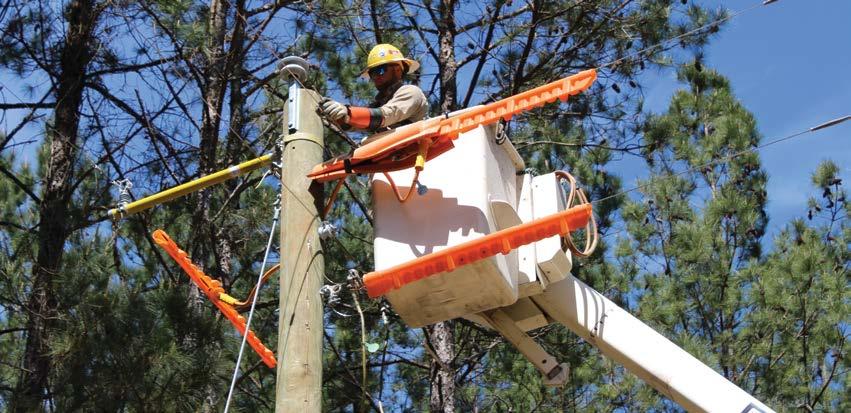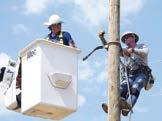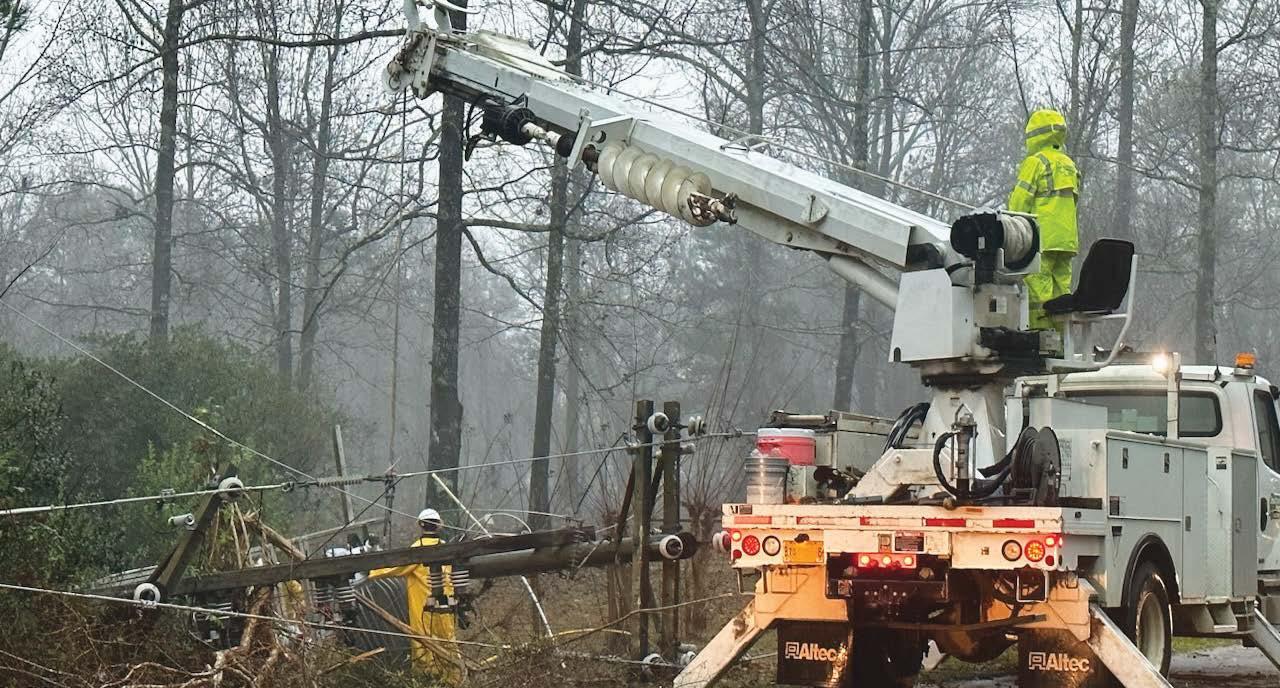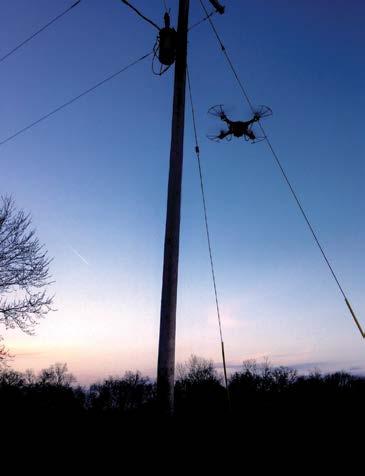NATIONAL FOREST ADVENTURES


PICTURE THIS: HOLIDAY GATHERINGS



SEASONAL HERBS FOR SPRING













NATIONAL FOREST ADVENTURES





SEASONAL HERBS FOR SPRING













Communicators from Mississippi nabbed six 2023 National Rural Electric Cooperative Association Spotlight on Excellence awards recently. The Spotlight on Excellence Awards program recognizes a body of outstanding work produced by electric cooperative communicators and marketing professionals from across the country.
Matt Bush, of Southern Pine Electric, won a silver award for the co-op’s 2022 annual report in the Best Annual Report to Members category.
In the Best Wild Card category, Amy Gri n of Cooperative Energy won the gold award for the Cooperative Energy Summit: Learning Experience. Justin Jaggers, with Northcentral Electric, won the silver award for his creation of a virtual reality tool used at career fairs.
Jason Patterson, of Yazoo Valley Electric, won a gold award in the Best Individual Ad category for his “Power in our Team” ad. Northcentral’s Justin Jaggers also won a gold award in the category for his “Don’t Miss a Moment” ad.
The communications sta at Electric Cooperatives of Mississippi — led by Vice President Lydia Walters — won a gold award in the Best Total Communication Program category for their work on rebranding and adding digital components to the Cooperative Youth Leaders events.

A huge boost in government spending on the nation’s infrastructure is increasing the already overwhelming demand for transformers and other crucial equipment needed by electric cooperatives, experts told local co-op leaders recently at PowerXchange.

The supply chain issues spurred by the COVID-19 pandemic caused production and deliveries to stop or slow down significantly for about 18 months, but challenges have continued in part because demand for transformers, electrical conductor, steel wire, and other material is at an all-time high, said Tim Mills, president and CEO of ERMCO, a manufacturing enterprise owned and operated by Arkansas co-ops.
Pearl River Community College (PRCC) recently broke ground on the Hancock Aviation Aerospace Workforce Academy, adjacent to Stennis International Airport and the Hancock High School Career & Technical Center.

The 36,000-square-foot training center will include a 18,000square-foot hangar to provide skilled workforce development for the aviation and aerospace industries.

“After years of e ort and support across multiple administrations, local, state, and federal partners, we are excited to see construction begin at Stennis International Airport on Pearl River Community College’s Workforce Academy. This institution and training programs will serve our existing and future industries creating opportunities for our regional workforce,” said Blaine LaFontaine, CEO of the Hancock County Port and Harbor Commission.
The academy is funded by the Mississippi Legislature, RESTORE Act grant money, an EDA Disaster Supplemental grant, Gulf Coast Restoration money, and a Coast Electric Power Association grant. The $2,475,000 hangar is also partially funded by a Coast Electric Power Association grant.


The construction of the $9,421,500 academy, which began Feb. 1, is projected to be completed in June 2024 with classes starting August 2024.
“There’s a massive gap between supply and demand,” Mills said. “What changed? Did supply drop or has there been a marked change in demand? The latter, I think, is what’s happening now.”

Demand has been driven up in part by an increase in new housing developments and by billions of dollars in new federal infrastructure spending, which is spurring competition for the same materials, said Chris Perry, president and CEO of the Kentucky Electric Cooperatives and United Utility Supply Cooperative Corp., which is owned by member co-ops in 17 states.
Perry cited demand created by the $1.2 trillion bipartisan infrastructure law of 2021, which is making a historic investment in upgrading the nation’s highways, roads, and bridges, deploying broadband service, and funding electric vehicle charging networks that require more transformers and electrical system improvements.
In addition to increased federal spending on infrastructure, the electrification of everything from transportation to heating and air conditioning and water heaters is also increasing the need for transformers and other electrical system equipment, Mills said. A rise in natural disasters is having an impact as well, he said.
The industrial sector can significantly boost output, Mills said, “but the question is, in what time period?”






“Can we get there? Yes. Will it be fast and overnight? I don’t think so.”
NRECA
They wake before the sun, pour steaming cups of co ee, and kiss their families goodbye. Then, they climb into their trucks and head out. This month, we celebrate Lineman Appreciation Day on April 14, with a well-earned pat on the back, a sincere thank you for a job well done, and a luncheon at the Corporate Center. Join us in celebrating our 4-County linemen, and those working across the country, who deliver safe, reliable electricity.
We often take power — and those who provide it — for granted. Let’s take a moment and stand in their boots.
Linemen have to work safely, smart, and e ciently—all while 40 to 100 feet in the air wearing sturdy, thick rubber gloves. On a typical day, lineworkers maintain electrical distribution lines or build service to new homes and businesses in 4-County’s service area. They have a lot on their plates. But that job can change in a million ways when rough weather steps in. When our dispatch center calls crews with a problem, everything else takes a backseat. Power restoration takes precedence on a lineworker’s to-do list. These brave workers are always on call. We have crews standing by to serve you 24 hours a day, in the middle of the night or wee hours of the morning, weekends and holidays.
Can you imagine getting a call at 3 a.m. telling you to work outside during bad weather? Not many people are willing to face storms. Our lineworkers face harsh elements daily, all to serve you. Linemen and co-ops stick together to accomplish this mission. Several of our lineworkers recently responded to a call for help from Northcentral Electric in Olive Branch. That co-op sustained outages associated with Winter Storm Mara. Our linemen left to help without even going home first. 4-County and most cooperatives around the nation have reciprocal agreements with each other to provide help for each other in times of crisis. It’s just one of the things that make rural electric cooperatives so special.
Lineworkers also focus on safety; the lives of coworkers are on the line. Job safety is important to everyone, no matter your occupation. But for lineworkers, there can be no slip ups or careless actions. Mistakes can cost a limb or life. That’s one of the reasons lineman form a brotherhood. When you put your life in the hands of co-workers every day, they become more than colleagues. They’re family.
That sense of family extends to electric co-ops across the nation. One of our principles is cooperation among cooperatives. We help other co-ops in their time of need, and they extend that service to us, too. It’s reassuring to know if a severe storm strikes, a national team of lineworkers stand ready to answer the call.
To be ready to respond no matter the situation or weather conditions, linemen are highly trained. At 4-County, lineworkers go through regular training to ensure they can work safely with various kinds of equipment. The equipment gets tested regularly, too.

These highly skilled linemen light our homes and businesses every day. They endure harsh weather and long hours, all to make our lives better. Today (and every day), please take a moment to thank them. 4-County Electric Power Association linemen are the heart of the Co-op Nation, proud and strong.
by Brian Clark CEO/General Manager
Warm temperatures this spring make it a great time to think about how warm it could get this summer. A rise in temperature can also mean a rise in energy bills. Give your air conditioner a fighting chance at keeping your home cool in the months ahead, without using more electricity than necessary.
HERE ARE SOME TIPS TO KEEP ENERGY BILLS LOWER THIS SUMMER:
• Trade your traditional incandescent light bulbs or compact fluorescent bulbs for light-emitting diode (LED) bulbs. These bulbs use far less energy.
• Call a service technician to give your air-conditioning system – and any window units – a thorough once over before the weather gets hot.
• Change air conditioner filters monthly from now until October.


Ceiling fans can be a great way to increase energy savings in your home while providing a comfortable living environment. A decorative alternative to typical light fixtures, ceiling fans can cut summer energy use.
Ceiling fans do not lower the temperature in a room. The cooling e ect occurs when air from the ceiling fan blows across a person’s skin. “When you leave the room, switch the fan and its lights o . You’ll save energy and money,” said Ronnie Vernon, 4-County marketing specialist.
For more information, go to www.4county.org.
“Improving the quality of life for all those we touch.”
❏ JUNE 1, 2023





❏ New Location! Communiversity 7003 S. Frontage Road in Columbus
❏ Registration & Health Fair • 9 a.m.
❏ Lunch • 10:15 a.m.

❏ Business Meeting • Noon
❏ Door Prizes • from 9 a.m. to 1 p.m. (Grand Prize is a Retired 4-County Fleet Truck!)

Mike Banks and Bill Bell are nominated for three-year terms on 4-County Electric Power Association’s board of directors.
Banks (District 4, Noxubee County) and Bell (District 7, At-Large), both of Macon, — and both current board members — were placed in nomination by the association’s nominating committee at its March 9 meeting. Nominations may also be made by petition. The deadline for those falls after press time. Any petition nominees will be listed in the May issue and will appear on your ballot.
Nominating committee reports were posted March 9 at both 4-County o ces and online. The deadline for additional nominations for directors, by petition of at least 50 consumermembers, was March 31, no later than noon.







Ballot/proxies will be mailed by May 2 to all 4-County members.




The deadline for returning ballot/proxies is May 26 by noon, six days prior to the annual membership meeting June 1.
Members of the nominating committee present for the March 9 meeting included: Paul Crowley, Doran Henry, Benny Graves, Charles McMinn, Donald Land, Pete O’Shea, Jr., Belk Weems, Gary L. Holtman, Frank Howell, John Partridge, Brian D. Power, Sammie L. Williams, James Gillespie, Grey Land III, Tom Breland, Henri Sue Kennard, and Odie L. Shaw.


Pursuant to Article II, Sections 1 and 3 of the 4-County Electric Power Association Bylaws, notice is hereby given that the Annual Meeting of members of 4-County Electric Power Association will be held Thursday, June 1, noon, at the Communiversity.







In accordance with the laws of the state of Mississippi and the Bylaws of the Association, two directors will be elected for threeyear terms, reports will be given on the operation of the Association for the past year and other matters of business will be addressed.

 Bru Sanders Secretary-Treasurer 4-County Electric Power Association Board of Directors
Bru Sanders Secretary-Treasurer 4-County Electric Power Association Board of Directors

I want to lower my energy use, but I don’t know where to start. How can I find out how much energy I use? What are some ways I can save energy without spending a lot of money?
Instead of thinking about your bills in terms of dollars, think about them in terms of kilowatt-hours. A kilowatt-hour is the unit of energy used for most electric bills. Review your monthly kWh use to get an idea of how much you use every month.
Once you’ve reviewed your energy use, set goals for the next month. Try to use less energy than the month before, and check your results on your next bill.
Some electric utilities o er time-of-use rates, which means electricity costs are dependent on the time of day. This pricing structure more closely reflects the cost to electric utilities and helps consumers understand that energy costs more when the demand for it is higher.
Even if your electric bill does not include time-of-use rates, it can be beneficial to delay energy-intensive chores or tasks to when demand is lower. Peak hours are typically in the morning as we prepare for work and in the evening when we get home and start preparing food and turning on entertainment devices. Doing laundry and running the dishwasher are easy activities to delay until after peak hours.
You can change your energy use by changing your behavior. When looking at electric bills, many people focus on the total dollar amount of the bill. When trying to manage your energy costs, I suggest changing your focus to energy use. While you don’t have control over the cost of the energy, you can control how much energy you use.




When looking for energy savings, remember that “o ” is the most e cient setting. Turning o lights is a classic strategy, especially if your lighting is incandescent. Consider switching to energy-saving LED lightbulbs.
Computers and gaming systems can waste energy even when in sleep mode. The higher the wattage and the more hours the device is on, the more energy used. Laptops use the least energy, followed by personal computers at about 200 watts. Gaming consoles typically use less energy than gaming PCs. Don’t forget to turn o the monitor as well.
You can lower your energy use even more with smart power strips, which cut power to devices that are not in use. Many electronics continue to draw power even when they are turned o . This could add 5% to 10% to your monthly bill, according to the Department of Energy. Installing smart power strips is an easy way to ensure devices are completely turned o and not drawing power.
When it comes to lowering your energy use, the settings on your thermostat are another great place to check. Keep in mind, the weather a ects your electric bill for heating and air conditioning.
The closer you can keep the indoor temperature to the outdoor temperature, the more you will save. You want to protect your home from damage in extreme heat and cold, but if you can turn the temperature down a few degrees in winter and up in summer, you will save on energy costs.
Ensuring your filters in your heating and cooling system are clean is an easy way to keep your system maintained and operating e ciently. Adding annual servicing by a professional maximizes the e ciency and can lengthen the life of your system.
Understanding your energy use and making small adjustments to your routine will help you reach your energy use goals.
 Miranda Boutelle is the chief operating o cer at E ciency Services Group in Oregon, a cooperatively owned energy e ciency company.
Miranda Boutelle is the chief operating o cer at E ciency Services Group in Oregon, a cooperatively owned energy e ciency company.
MILESTONE 10,000th








FASTnet, 4-County Electric Power Association’s wholly-owned broadband subsidiary, recently celebrated a milestone with the Doss family of Monroe County’s Prairie community.


Ada Doss is the 10,000th FASTnet customer.


Co-op and broadband o cials celebrated the event in March. Held at the 4-County Corporate Center, the event was attended by co-op employees, FASTnet employees, the Doss family and community o cials. Attendees enjoyed cake, learned a little about fiber and the Doss family was presented with a gift basket of electric goodies.
“We’re excited to celebrate this milestone,” said 4-County/ FASTnet CEO Brian Clark. “Our communities have embraced this broadband service, and we’re ready to provide it for them. It will certainly open technological doors for the people in our service area. We look forward to the celebration of more milestones in the future.”
Recently, FASTnet began connecting customers in Prairie. Next on the connection schedule is the Macon area, followed by Sturgis, Ackerman, and Weir.
For more information on FASTnet, please call 1-800-431-1544 or go to www.4cFASTnet.com.







 by Abby Berry
by Abby Berry
Spring and summer are opportune times for home upgrades and DIY projects. If you’re planning to make improvements to your home, consider upgrades that promote better e ciency.
Here are a few projects that can help you save energy and money as well as increase the comfort of your home.
Installing a smart thermostat is one of the simplest ways to manage home energy use and keep summer bills in check. Smart thermostats are easy to install and allow you to control your heating and cooling system from your phone. You can purchase an ENERGY STAR®certified smart thermostat for as low as $100, which can save you 8% on annual heating and cooling costs, about $50 per year. This upgrade will quickly pay for itself, and you’ll gain insight into better ways to heat and cool your home.
Speaking of smart, additional devices like smart LED bulbs also o er convenient control and help boost energy savings at home. With smart lighting, you can set a schedule for when and how your lights should be turned on or o . And the next time you head out to run errands and realize you left the lights on, all you have to do is turn them o through your phone. Smart lights come in a variety of shapes, colors, and brightness levels — and you can purchase bulbs for indoor or outdoor use. Schedule outdoor smart lights to illuminate your home at night and when you’re out of town for better security.

While it’s not as trendy as incorporating smart technologies, sealing air leaks around your home is a simple, e ective way to save energy and lower your bills. Applying new (or replacing old) weather
stripping around doors and windows can instantly make your home more comfortable and reduce energy waste. Applying caulk to fill gaps can also improve the seal of your home. Caulk can be applied to a variety of areas, including windows, doors, bathtubs, and sinks.
If your home feels too warm during summer (and too chilly during winter) even after you’ve sealed with weather stripping and caulk, your home may need additional insulation. Insulation is considered a more expensive e ciency upgrade; however, if your home is underinsulated, additional insulation can make a big impact on reducing energy use and costs. The cost of new insulation depends on a variety of factors like materials, size of the home, and whether you use a contractor. Typically, the project costs can be recouped in a few years and your home will immediately feel more comfortable.

Of course, there are additional e ciency upgrades that can make a big impact on energy use, like replacing old appliances with ENERGYSTAR® models or replacing old, leaky windows with new, energy e cient windows. But these upgrades can be a bit pricey.
If you’re wanting to make your home more energy e cient but you’re not sure where to start, your best bet is to enlist the help of an expert to conduct an energy audit of your home. An energy audit can easily identify areas to boost e ciency, and then you can determine the projects you want to tackle first based on your budget and needs.
A group of 82 high school juniors from all over the state gathered in Jackson from March 1 to March 3 for the 36th Electric Cooperatives of Mississippi Cooperative Leaders Workshop. The program instills leadership skills, inspires creative thinking, encourages community service, and introduces students to legislative elected o cials from their communities.
The conference was held at The Westin in downtown Jackson. The students earned the trip to the workshop following a competitive selection process sponsored by their local electric cooperative. They will

travel to Washington, D.C. in June for a six-day youth leadership tour.













Central Electric students Drew Kelly, Kendall Bracewell, Keondrae Anderson, Maggie Taylor, and Sara Kelly spent the three days in Jackson with other students from around the state. They met with their state lawmakers, toured the state capitol, participated in problem solving activities, and attended speeches by motivational speakers who urged them to serve their communities.
Gov. Tate Reeves and Secretary of State Michael Watson spoke to the students during the workshop.









I want to lower my energy use, but I don’t know where to start. How can I find out how much energy I use? What are some ways I can save energy without spending a lot of money?
Instead of thinking about your bills in terms of dollars, think about them in terms of kilowatt-hours. A kilowatt-hour is the unit of energy used for most electric bills. Review your monthly kWh use to get an idea of how much you use every month.
Once you’ve reviewed your energy use, set goals for the next month. Try to use less energy than the month before, and check your results on your next bill.
Some electric utilities o er time-of-use rates, which means electricity costs are dependent on the time of day. This pricing structure more closely reflects the cost to electric utilities and helps consumers understand that energy costs more when the demand for it is higher.
Even if your electric bill does not include time-of-use rates, it can be beneficial to delay energy-intensive chores or tasks to when demand is lower. Peak hours are typically in the morning as we prepare for work and in the evening when we get home and start preparing food and turning on entertainment devices. Doing laundry and running the dishwasher are easy activities to delay until after peak hours.
You can change your energy use by changing your behavior. When looking at electric bills, many people focus on the total dollar amount of the bill. When trying to manage your energy costs, I suggest changing your focus to energy use. While you don’t have control over the cost of the energy, you can control how much energy you use.




When looking for energy savings, remember that “o ” is the most e cient setting. Turning o lights is a classic strategy, especially if your lighting is incandescent. Consider switching to energy-saving LED lightbulbs.
Computers and gaming systems can waste energy even when in sleep mode. The higher the wattage and the more hours the device is on, the more energy used. Laptops use the least energy, followed by personal computers at about 200 watts. Gaming consoles typically use less energy than gaming PCs. Don’t forget to turn o the monitor as well.
You can lower your energy use even more with smart power strips, which cut power to devices that are not in use. Many electronics continue to draw power even when they are turned o . This could add 5% to 10% to your monthly bill, according to the Department of Energy. Installing smart power strips is an easy way to ensure devices are completely turned o and not drawing power.
When it comes to lowering your energy use, the settings on your thermostat are another great place to check. Keep in mind, the weather a ects your electric bill for heating and air conditioning.
The closer you can keep the indoor temperature to the outdoor temperature, the more you will save. You want to protect your home from damage in extreme heat and cold, but if you can turn the temperature down a few degrees in winter and up in summer, you will save on energy costs.
Ensuring your filters in your heating and cooling system are clean is an easy way to keep your system maintained and operating e ciently. Adding annual servicing by a professional maximizes the e ciency and can lengthen the life of your system.
Understanding your energy use and making small adjustments to your routine will help you reach your energy use goals.
 Miranda Boutelle is the chief operating o cer at E ciency Services Group in Oregon, a cooperatively owned energy e ciency company.
If you want to use less energy, start by setting goals. Review your monthly kilowatt-hour use to get an idea of how much energy you use every month, then set goals for the next month.
Miranda Boutelle is the chief operating o cer at E ciency Services Group in Oregon, a cooperatively owned energy e ciency company.
If you want to use less energy, start by setting goals. Review your monthly kilowatt-hour use to get an idea of how much energy you use every month, then set goals for the next month.


 by Qua’Shara Monix
by Qua’Shara Monix


Only about two weeks into spring and the rebirth of the natural world is waking up and reviving. The days start getting longer, the trees take shape, flowers begin to bloom, and warmer weather allows us to spend more time enjoying the outdoors.


kick o their season beginning April 11, 2023, and ending May 31, 2023.













will o cially begin on April 13 around 5 p.m. Numerous free outdoor stages will be set up throughout the downtown area. On Saturday morning, April 15, the annual 5K run/walk marathon takes place. Most of the daytime music stages and street vendors operate between 10 a.m. and 6 p.m.

National Lineman Appreciation Day is celebrated this year on April 18. We graciously honor the hard work, innovation, and dedication of America’s electric lineworkers and those who work very close and help them obtain a smooth productive work day. If you happen to pass one of these friendly faces or… If you have LIGHTS … #ThankALineman

 Photos by Brandee Lott
Photos by Brandee Lott















 Ahmad Price APPRENTICE LINEMAN
Cameron Stubbs APPRENTICE LINEMAN
Evan Campbell APPRENTICE LINEMAN
Hays Stubbs ENGINEERING SUPERVISOR
Anthony Simpson APPRENTICE LINEMAN
Clyde Ray CREW LEADER
Dayton Sparks APPRENTICE LINEMAN
Hunter Sta ord APPRENTICE LINEMAN
Browning Earp APPRENTICE LINEMAN
Colton Hitchcock APPRENTICE LINEMAN
Ellio Lovelady WAREHOUSE
Jack Wells APPRENTICE LINEMAN
Bryan Glover PURCHASING
Dalton Birmingham APPRENTICE LINEMAN
Eric Russell COAHOMA OPERATIONS SUPERVISOR
Ahmad Price APPRENTICE LINEMAN
Cameron Stubbs APPRENTICE LINEMAN
Evan Campbell APPRENTICE LINEMAN
Hays Stubbs ENGINEERING SUPERVISOR
Anthony Simpson APPRENTICE LINEMAN
Clyde Ray CREW LEADER
Dayton Sparks APPRENTICE LINEMAN
Hunter Sta ord APPRENTICE LINEMAN
Browning Earp APPRENTICE LINEMAN
Colton Hitchcock APPRENTICE LINEMAN
Ellio Lovelady WAREHOUSE
Jack Wells APPRENTICE LINEMAN
Bryan Glover PURCHASING
Dalton Birmingham APPRENTICE LINEMAN
Eric Russell COAHOMA OPERATIONS SUPERVISOR





















This month, we celebrate lineworkers. I can only imagine what it must have been like decades ago to see a lineworker bring light to your home for the first time. As technology has progressed in the years following, our world has become more electrified. Electrical distribution systems have advanced to keep up with the changes, requiring lineworkers to take on new challenges. Even though we’re plugging in more than ever, most of us don’t think about the amount of work that goes into bringing service to our homes when we flip a switch. We don’t often think about how much we appreciate power until we lose it. This month, I challenge you to take a moment to think of our line crews every time you walk into your home and flip a switch. Their work powers our homes and



businesses, and that’s not an easy job. Lineworkers are highlytrained and skilled workers bringing an essential service to our communities. I am grateful for them not just this month, but every day. If you see one of these hard-working folks out, please make sure you take a moment to say a word of thanks to these heroes in our community.













A group of 82 high school juniors from all over the state gathered in Jackson from March 1 to March 3 for the 36th Electric Cooperatives of Mississippi Cooperative Leaders Workshop.



The program instills leadership skills, inspires creative thinking, encourages community service, and introduces students to legislative elected o cials from their communities.






The conference was held at The Westin in downtown Jackson.



The students earned the trip to the workshop following a competitive selection process sponsored by their local electric

cooperative. They will travel to Washington, D.C., in June for a six-day youth leadership tour.
Coast Electric students Anna Gautreaux, Landon Blake, Lindsey Holloway and Philip Ugochukwu spent the three days in Jackson with other students from around the state. They met with their state lawmakers, toured the state capitol, participated in problem solving activities, and attended speeches by motivational speakers who urged them to serve their communities.
Gov. Tate Reeves and Secretary of State Michael Watson spoke to the students during the workshop.











Coast Electric wants you to reduce your energy use and see savings on your energy costs. Visit www.coastepa.com and fill out our entry form. It only takes a few seconds, and you could win a prize that helps you save!
Congratulations to Lolita Lee, the winner of our February Reduce Your Use prize!
There are so many things you can do this Earth Month to unplug, recharge and celebrate the beauty of Mississippi’s natural environment. One of the easiest is signing up for paperless billing with Coast Electric. When you choose to receive your bill electronically, it reduces waste and cuts costs. That’s a win/win! To sign up, you can visit www.coastepa.com and fill out a quick form or you can visit an o ce to ask a member service representative for help.
Charitable organizations that serve Hancock, Harrison or Pearl River counties could be eligible for a grant of up to $10,000!
Since 2019, Operation Round Up has given back more than $1 million in grants thanks to the generosity of our members. We thank you for supporting your local community and we are excited to share that grant applications are available for the month of February
Ainsley’s Angels pairs runners with people who use wheelchairs to participate in races as a team. Ainsley’s Angels ambassadors in south Mississippi now have a 14-foot enclosed trailer thanks to friends of the program and Coast Electric members like you. Ambassadors use the trailer, equipped with a 12-foot awning and interior lights, to transport modified wheelchairs for participating racers.

SCAN HERE OR VISIT WWW.COASTEPA.COM
TO LEARN MORE AND APPLY TODAY!
Funds for the trailer were provided by a grant from Coast Electric’s Operation Round Up program, which is funded by coop members who round up their monthly bills, and by others in the community who support the organization’s mission. To learn more about Operation Round Up and the grant application process, visit www.coastepa.com.
Thanks to all of our members who participate in Operation Round Up. Your spare change is making a big change for organizations like Ainsley’s Angels!






$3,686,291










On May 12, 2023, Delta Electric Power Association will mail capital credit refund checks to Members, as the cooperative has done for the past 33 years. These capital credit refund checks will be mailed to all Members who received a bill from Delta Electric during the years 1999 and 2022.









The operating margin refund in the amount of $3 million will be 50% of 1999 operating margins along with approximately 12.7% of 2022 operating margins.

“In addition, we are pleased to announce that non-operating margins for years 1993 (100%) and 2009 (7%) in the amount of $686,291 will be included in this refund,” said David O’Bryan, general manager. Delta Electric’s non-operating margins consist solely of margin allocations from Cooperative Energy,
Delta Electric’s generation and transmission cooperative, headquartered in Hattiesburg.






Any unpaid bills will be recovered prior to issuance of the checks.





Since 1989, when the first capital credit refunds were made, and including this year’s refund, Delta Electric has returned to Members a total of almost $78 million.
Unlike an investor-owned utility, which is operated for profit, Delta Electric is a Cooperative and does not operate on a profit basis. Each bill a Member pays goes toward the funding of the Cooperative. All revenue is used to operate, maintain and improve the Cooperative for the benefit of its Members. Any revenue received in excess of expenses is allocated back to Members for future retirement.

I want to lower my energy use, but I don’t know where to start. How can I find out how much energy I use? What are some ways I can save energy without spending a lot of money?






Instead of thinking about your bills in terms of dollars, think about them in terms of kilowatt-hours. A kilowatt -hour is the unit of energy used for most electric bills. Review your monthly kWh use to get an idea of how much you use every month.

Once you’ve reviewed your energy use, set goals for the next month. Try to use less energy than the month before, and check your results on your next bill.

If you want to use less energy, start by setting goals. Review your monthly kilowatt-hour use to get an idea of how much energy you use every month, then set goals for the next month.
You can change your energy use by changing your behavior. When looking at electric bills, many people focus on the total dollar amount of the bill. When trying to manage your energy costs, I suggest changing your focus to energy use. While you don’t have control over the cost of the energy, you can control how much energy you use.



Some electric utilities offer time-of-use rates, which means electricity costs are dependent on the time of day. This pricing structure more closely reflects the cost to electric utilities and helps consumers understand that energy costs more when the demand for it is higher.
Even if your electric bill does not include time-of-use rates, it can be beneficial to delay energy-intensive chores or tasks to when demand is lower. Peak hours are typically in the morning as we prepare for work and in the evening when we get home and start preparing food and turning on entertainment devices. Doing laundry and running the dishwasher are easy activities to delay until after peak hours.

When looking for energy savings, remember that “off” is the most efficient setting. Turning off lights is a classic strategy, especially if your lighting is incandescent. Consider switching to energy-saving LED lightbulbs.
Computers and gaming systems can waste energy even when in sleep mode. The higher the wattage and the more hours the device is on, the more energy used. Laptops use the least energy, followed by personal computers at about 200 watts. Gaming consoles typically use less energy than gaming PCs. Don’t forget to turn off the monitor as well.
You can lower your energy use even more with smart power strips, which cut power to devices that are not in use. Many electronics continue to draw power even when they are turned off. This could add 5% to 10% to your monthly bill, according to the Department of Energy. Installing smart power strips is an easy way to ensure devices are completely turned off and not drawing power.
When it comes to lowering your energy use, the settings on your thermostat are another great place to check. Keep in mind, the weather affects your electric bill for heating and air conditioning.

The closer you can keep the indoor temperature to the outdoor temperature, the more you will save. You want to protect your home from damage in extreme heat and cold, but if you can turn the temperature down a few degrees in winter and up in summer, you will save on energy costs.

Ensuring your filters in your heating and cooling system are clean is an easy way to keep your system maintained and operating efficiently. Adding annual servicing by a professional maximizes the efficiency and can lengthen the life of your system. Understanding your energy use and making small adjustments to your routine will help you reach your energy use goals.
Miranda Boutelle is the chief operating officer at Efficiency Services Group in Oregon, a cooperatively owned energy efficiency company.
If you can turn the temperature down a few degrees in winter and up a few in summer, you will save on energy costs.Mother Nature tends to have a mind of her own. Utility power lines are constantly at risk from severe storms — particularly fallen and overgrown tree limbs, which can lead to power outages. It’s estimated that 50% of outages can be attributed to overgrown vegetation, which is why electric co-ops regularly trim and maintain their local systems.

This tried-and-true method requires a significant amount of onthe-ground labor, including manual data collection, in which dozens of workers assess the vegetation that needs to be cleared while walking below the infrastructure, as well as manual verification of the work’s quality and completion by contractors.
This is how things have been done for the past few decades. This method has been e ective, but in the era of extreme weather events and accelerating digitalization, electric co-ops are looking to innovative vegetation management methods to improve power reliability for the members they serve.

Technology advancement will continue to impact vegetation management, and electric co-ops are committed to staying informed and undertaking modernization e orts. By utilizing technology, co-ops may be able to dispatch crews to perform trimming at the ideal moment and location, preventing additional outages while enhancing productivity, cutting costs and providing better service. Timely monitoring and maintenance are necessary to identify assets that are prone to sustain damage or catch fire, so co-ops are tasked with selecting the right technology to make this process more e cient.
The ideal technology will ensure a consistent supply of energy while managing the environment. Today, there are cutting-edge vegetation management tools, each with its advantages.
LiDAR, which stands for “light detection and ranging,” gives exact, three-dimensional data about the shape of the surface around utility assets. LiDAR is a popular way to scan portions of forests to determine how tall trees are and acquire information about their health, like whether a tree has leaves. LiDAR doesn’t provide data on how healthy plants are in general, but the technology can be paired with highresolution multispectral satellite imagery to obtain accurate information
about the health of the plants surrounding power lines. Timely data like this is extremely beneficial and can help electric co-ops make more proactive planning decisions.
Electric co-ops are also using drones to keep an eye on and control the growth of trees and plants near power lines. Drones fly very close to assets so they can take the clearest images and provide data to help keep an eye on how close vegetation is to equipment and check the health of trees to see if they are likely to fall.


Many co-ops are utilizing drones with cameras, which began as a novelty tech for utilities but are now considered essential tools. When it comes to taking care of surrounding vegetation, drones are often used for detailed surveys. Drones are used to inspect a single area and do all the necessary checks without putting operators in danger.
Electric co-ops place a high focus on vegetation management. It is the most crucial tool for reducing the likelihood of power outages. A thorough understanding of the vegetation’s past, present, and projected future is essential for a successful approach to reducing these risks.
Jennah Denney writes on consumer and cooperative a airs for the National Rural Electric Cooperative Association. Electric co-ops are also using drones to keep an eye on and control the growth of trees and plants near power lines. This image shows the view from a drone. As they fly near equipment, drones can help utilities determine the health of trees to see if they are likely to fall.





In last month's issue, we included an article on the rate changes that go into e ect on your April billing statement. This month, I wanted to give a little more background on the reasons for the changes. As we stated in last month's article, the last change in rates was six years ago, in 2017. Since then, and especially over the previous three years, much has changed in the cost of goods, materials, fuel, and just about everything else. And very little of the change has been for the better.

Inflation is higher than we've seen in decades. You'd have to go back to 1981 to see a higher annual inflation rate. But inflation doesn't tell the whole story. We have all seen the cost of feeding our families skyrocket over the past two or three years. Milk, bread, and eggs have all exceeded more than 14%, with the average increase in groceries over 12%. The cost of vehicles, new and used, as well as vehicle maintenance, are up over 10%. Health insurance rose by over 20%. The list goes on.
Our industry hasn't been immune to these changes. Most of the materials and equipment we use daily to build and maintain a reliable electric system have seen increases that can only be described as astronomical. I've included a chart showing the increases in some basic equipment needed for a safe, e cient, and reliable electric system. These include poles, transformers, conductors, conduits, and several others.
The fuel cost for our bucket and digger derrick trucks is also higher than it was three years ago. The cost of fuel also means that the cost of services such as vegetation management and pole inspections, which contractors provide, has also increased as those contractors have had to deal with these same issues.

We've worked to push a change in rates out as far as possible because we know its impact on our members. But with costs increasing on basically every front, we've reached a point where a change is necessary. We will continue to strive to control costs where we can while still providing the safe, reliable service you've come to expect. I also want you to know that even though these changes are an increase, Dixie Electric's rates will be comparable with other utilities in the surrounding areas and across the state.
Maintaining safe, reliable service will always be our primary goal, but it does come at a cost. It's hard to predict how inflation and pricing will impact our business in the future. Still, we will always work to control costs as much as possible while protecting our cooperative's financial integrity and stability.
As always, thank you for being a valued member of Dixie Electric Power Association. Even in these uncertain times, we look forward to continuing to be your trusted energy provider.





 by Randy Smith General Manager
by Randy Smith General Manager

Preparing backpacks for children in foster care has become a timehonored tradition at Dixie Electric. In November 2022, employees sold tickets to Dixie Electric’s annual 12 Days of Christmas drawing, raising $5,585 for local foster backpack programs.
In February, the proceeds and additional donations from employees were used to purchase items to fill 200 backpacks for children in foster care in Jones, Forrest, Wayne, Perry, and Clarke counties. These backpacks are used to inspire communities to bring dignity and hope to children in foster care.



Employees filled the backpacks with various comforting items, including toys, clothing, diapers, toiletries, a nightlight, and personal hygiene products. These backpacks are designed to help make the transition into foster care easier for the child and the foster family receiving them.
“What a blessing it is to have a community of people who want to help foster children in our county,” said Dixie Electric member and foster parent Ashlie Hernandez. “Most people do not realize that when a child is taken into CPS custody, they do not typically have the luxury of packing all of their belongings. Many times, children arrive to the foster home with nothing but the clothes on their backs. So, the idea of them having a backpack with essentials to get through those first few days is incredible. Thank you, Dixie Electric, for such a thoughtful service. We’re blessed to have you working in our community.”
For more information on how you can get involved, contact the Mississippi Department of Child Protection Services.
It’s no secret that being a lineman is a tough job. It takes a serious commitment, as being a lineman is more than just a job; it’s a lifestyle. Despite the many challenges, Dixie Electric’s linemen are committed to powering our local community. Because of our appreciation for our linemen, we honor them each year on April 18, Lineman Appreciation Day.
Our linemen are absolutely essential to the life of our community. Without their exceptional dedication and commitment, we simply would not have the reliable electricity that we need for everyday life. We are thankful for the outstanding group of linemen we have at Dixie Electric.
Dixie Electric Power Association clears trees, limbs, and underbrush from the area around and below the power lines, called the right-ofway. Right-of-way clearing decreases the number of outages and reduces the risk of someone coming in contact with the power lines. Clearing the right-of-way protects individuals from the hazards of electricity and makes power restoration quicker and safer for both Dixie Electric’s members and personnel.
Diamond: Waynesboro, Chapparal, Cypress Creek, Shubuta
Macedonia: Macedonia, Sunrise, Barrontown, Union
West Laurel: Ellisville, Calhoun, Soso, Moss, Shady Grove
Osmose Utilities Services will be performing inspection and maintenance on some of Dixie Electric Power Association’s poles during the next year, beginning in January and continuing for approximately four months. The general areas to be inspected will be Soso, Hebron, Shady Oak, Big Creek, Indian Springs, and Moss.
This work will generally consist of excavating a hole about 18” deep around the poles to inspect them and applying a preservative and/or remedial treatment to the poles as needed. The purpose of the inspection and treatment is to identify poles that do not meet industry strength standards and to extend the useful life of all others.
All Osmose contract workers will be identifiable by their yellow and orange Osmose work vests and hard hats. Osmose vehicles should be marked with Osmose Utility decals as well as Dixie Electric Power Association “Contractor” decals.
Cooperatives are a little di erent than most businesses. Because we are not-for-profit, we put our focus on people, not profits, which helps us better serve our community. Everything we do centers around the homes and businesses that receive electric or broadband service from us, and our team works to ensure that every project and program we o er is beneficial to our membership.
One way we keep well-informed of our members’ needs is by gathering valuable feedback, and we do this in several di erent ways. First, our board of directors is made up of members, just like you, who help guide the cooperative’s decisions. We also host events throughout the year, such as energy fairs and our annual meeting, to make sure you are an active part of our cooperative. Lastly, we conduct surveys to identify what’s most important to our members so that we can make improvements where needed.
In November 2022, Touchstone Energy Cooperative conducted a survey of our membership to determine the areas you are most satisfied with and those areas where you would like to see improvements. We learned a lot from our survey results, and, among the findings, we received a score on the American Customer Satisfaction Index. We are pleased to announce that Dixie Electric received a score of 90, putting your electric cooperative among the top nine percent of all cooperatives in the nation.
Our score directly reflects Dixie Electric’s quality of employees, reliability of the system, communication e orts, and commitment to our community. Our score is also a clear indicator of our dedication to customer service, which is at the heart of everything we do. We value your input and thank those who took the time to complete this survey.
We are proud of our 90, but we know there are always opportunities to improve our service. We will use these results, as well as all other feedback from our members, to ensure we are providing the highest level of service. Your opinion matters to us, and we are always here to listen.
American Customer Satisfaction Index score
90
73 National average for all other utilities
Overall satisfaction among residential members
92
95 Service reliability highest rated attribute
We can help you select the internet plan that’s “eggsactly” right for your nest. Get linked at DEFastlink.net.

A group of 82 high school juniors from all over the state gathered in Jackson from March 1 to March 3 for the 36th Electric Cooperatives of Mississippi Cooperative Leaders Workshop. The program instills leadership skills, inspires creative thinking, encourages community service, and introduces students to legislative elected o cials from their communities.
The conference was held at The Westin in downtown Jackson. The students earned the trip to the workshop following a competitive selection process sponsored by their local electric cooperative. They will


travel to Washington, D.C. in June for a six-day youth leadership tour.















Dixie Electric students Bella Lane, Brice Williams, and Dillon Burnham spent the three days in Jackson with other students from around the state. They met with their state lawmakers, toured the state capitol, participated in problem solving activities, and attended speeches by motivational speakers who urged them to serve their communities.
Gov. Tate Reeves and Secretary of State Michael Watson spoke to the students during the workshop.








When I was a young boy, I knew spring was near when my grandfather and my dad got their old Farmall Super A’s out of the barn to begin spring planting. They would disk up the garden patches then put the plows on their tractors to get the rows ready for planting. The seeds they planted in the spring would grow into fresh vegetables for late summer, fall and winter.
Jim Rohn, a man some consider to be America’s Foremost Business Philosopher, summed up what I believe my grandfather and my dad’s thoughts were about raising food when he said, “Everyone has to get good at one of two things — planting in the spring or begging in the fall.”
Today, I believe the same is true in the electric utility industry. We as an industry must “get good” at building the required infrastructure needed to serve our communities. Recently, I had the opportunity to speak to the Tennessee Valley Authority (TVA) Board of Directors. Below are my remarks.
In December of 1977, a 19-year-old man was facing a life decision. Should he take a job with the local electric cooperative or one at a new Delco assembly line? He told his dad that it was a hard choice to make. His father replied, “Son, I don’t think it’s a di cult decision. What’s the first thing you do when you walk into a room?” Puzzled, the young man just looked at his dad. “You flip on a light switch! People will always need electricity. Assembly plants come and go, but the cooperative will always be a part of our community.” Now, over 45 years later, I would like to think that this dad is proud of his son, who helped build an a ordable and reliable distribution system at East Mississippi Electric Power Association.


EMEPA delivers wholesale power from Mississippi Power Company (64%) and TVA (36%). Just over 37,500 members expect the lights to come on when they flip that switch. Our mission is to deliver services that empower lives as we pursue our vision of building pathways for community success.





During my years of service at EMEPA, I’ve responded numerous times to power outages caused by hurricanes, tornados, ice storms, equipment failures, and careless human drivers.

On December 23 and 24, 2022, I was called to the o ce by both Mississippi Power and TVA for an entirely di erent reason. The increased power demand from extreme cold temperatures and members being home for the holidays made for a perfect storm that risked exceeding the capacity of the generation fleet. For the first time in my 45-year career, we responded by turning o power to our members. While Mississippi Power was able to handle the loads with conservation requests, TVA was not. Let me assure you, restoring power after a storm is much more rewarding than interrupting a member’s service.
I have witnessed the pendulum swing from cost cutting to focused planning and building many times. I have also witnessed a switch from TVA trying to do and control everything, to distributors partnering to solve problems and build needed infrastructure. For example: In 1980, EMEPA purchased the outage prone TVA 46KV transmission lines used to serve our members and invested cooperative funds to repair and revive them, thus restoring faith in us and TVA.
Since Christmas, numerous federal and state politicians, as well as EMEPA members, have asked me how we reached this point. My response is simple: a foolish man tears down his barns before he has built new ones.
For far too long we have focused on what we CAN’T do instead of what we MUST do for the future of our communities. As my father said, it is our responsibility to ensure that when someone walks into a room and flips a switch, the light comes on and burns brightly for all to see.
by Randy Carroll CEO — East Mississippi Electric Power AssociationA group of 82 high school juniors from all over the state gathered in Jackson from March 1 to March 3 for the 36th Electric Cooperatives of Mississippi Cooperative Leaders Workshop.

The program instills leadership skills, inspires creative thinking, encourages community service, and introduces students to legislative elected o cials from their communities.

The conference was held at The Westin in downtown Jackson. The students earned the trip to the workshop following a competitive selection process sponsored by their local electric cooperative. They will

travel to Washington, D.C. in June for a six-day youth leadership tour.











East Mississippi Electric Power Association students Abby Godwin, Chloe Hillyer, Corey Kingery, Isaiah Rios, and Star Wade spent the three days in Jackson with other students from around the state. They met with their state lawmakers, toured the state capitol, participated in problem solving activities, and attended speeches by motivational speakers who urged them to serve their communities.
Gov. Tate Reeves and Secretary of State Michael Watson spoke to the students during the workshop.

When you think of an electric cooperative, chances are that you get a mental picture of an electric lineman. Without our linemen, you wouldn’t have the electricity you need to live in today’s world, and more importantly, when storms come through south Mississippi and knock out power, it’s our linemen that you rely on to get it restored as quickly and safely as possible.

Because of their importance not only to our Magnolia Electric Power members, but across the nation, the second Monday in April has been designated as National Lineman Appreciation Day.


Electric linemen often do not receive the recognition they deserve. They work all hours of the day, often in hazardous conditions far from




their families, going above and beyond to restore power to their communities. Our linemen, as well as linemen from across the nation, truly deserve this special day of recognition.
At our April Safety Meeting, MEP will honor the hard-working linemen of our company who often face challenging conditions to maintain the more than 4,962 miles of power lines in parts of six counties that make up our electrical system.

But before we get to that special day, MEP proudly recognizes all our electric linemen for the services they perform in dangerous conditions to keep power flowing and protect the public’s safety. This month we invite you to take a moment to thank a lineman for the work they do!







Bo Allen
Brett Abernathy
Lonnie Ball


Nyles Branch
Kent Breland
Dillon Brent
Nathan Bullock
Dennis Butler
Wes Burns
Jett Calcote
Terry Causey
Corey Fletcher
Alex Fortenberry
Colby Fortenberry
Jacob Gill
James Grady
Tanner Gunther
Matthew Hamilton
Tyler Hodges
Daniel Hollingsworth
Terry Jackson
Matt Lee
Dorneail Magee
Jason Mallette
Chad Moak
Luke Morgan
Jonathan McCaskill
Stacy McCaskill
Jase Roberts
Torun Robinson
Dustin Rollinson
Aaron Stewart
Justin Thomas
Chance Thompson
Jason Wilson
Paul Wilson
Andrew Wood








A group of 82 high school juniors from all over the state gathered in Jackson March 1-3 for the 36th Electric Cooperatives of Mississippi (ECM) Cooperative Leaders Workshop.
The conference, held at The Westin in downtown Jackson, instills leadership skills, inspires creative thinking, encourages community service, and introduces students to legislative elected o cials from their communities.


The students earned the trip to the workshop following a competitive selection process sponsored by their local electric cooperative. The entire group will travel to Washington, D.C. in June for a six-day youth leadership tour.
Magnolia Electric Power’s three representatives — Brice Peeples, Isabella Clark, and Maggie Sheppard – spent the three days in Jackson with other students from around the state. They met with their state lawmak-

ers, toured the state capitol, participated in problem solving activities, and attended speeches by motivational speakers who urged them to serve their communities.
Some of the highlights of the trip included Gov. Tate Reeves and Secretary of State Michael Watson, who spoke to the students. The students also enjoyed a breakfast with their local legislators, which included Representatives Vince Mangold and Angela Cockerham and Senators Kelvin Butler and Jason Barrett.
The students also got the opportunity to see Representatives Becky Currie, Daryl Porter, Bill Piggott, and Sam Mims at the state capitol along with Senator Melanie Sojourner.
Another highlight was Representative Vince Mangold recognizing the students from the floor of the House of Representatives.







Magnolia Electric Power wants to thank all of our local legislators for always supporting our youth leadership program.




Brice Peeples, Isabella Clark, and Maggie Sheppard had the distinct opportunity to see all of our local legislators in Jackson, whether it was at the early morning Breakfast with the legislators, or in action at the capitol.








Representative Angela Cockerham
Representative Becky Currie
Representative Vince Mangold
Representative Sam Mims
Representative Bill Piggott
Representative Daryl Porter
Senator Jason Barrett
Senator Kelvin Butler
Senator Melanie Sojourner


 by Abby Berry
by Abby Berry
Spring and summer are opportune times for home upgrades and DIY projects. If you’re planning to make improvements to your home, consider upgrades that promote better e ciency.
Here are a few projects that can help you save energy and money as well as increase the comfort of your home.
Installing a smart thermostat is one of the simplest ways to manage home energy use and keep summer bills in check. Smart thermostats are easy to install and allow you to control your heating and cooling system from your phone. You can purchase an ENERGY STAR®certified smart thermostat for as low as $100, which can save you 8% on annual heating and cooling costs, about $50 per year. This upgrade will quickly pay for itself, and you’ll gain insight into better ways to heat and cool your home.
Speaking of smart, additional devices like smart LED bulbs also o er convenient control and help boost energy savings at home. With smart lighting, you can set a schedule for when and how your lights should be turned on or o . And the next time you head out to run errands and realize you left the lights on, all you have to do is turn them o through your phone. Smart lights come in a variety of shapes, colors, and brightness levels — and you can purchase bulbs for indoor or outdoor use. Schedule outdoor smart lights to illuminate your home at night and when you’re out of town for better security.

While it’s not as trendy as incorporating smart technologies, sealing air leaks around your home is a simple, e ective way to save energy and lower your bills. Applying new (or replacing old) weather
stripping around doors and windows can instantly make your home more comfortable and reduce energy waste. Applying caulk to fill gaps can also improve the seal of your home. Caulk can be applied to a variety of areas, including windows, doors, bathtubs, and sinks.
If your home feels too warm during summer (and too chilly during winter) even after you’ve sealed with weather stripping and caulk, your home may need additional insulation. Insulation is considered a more expensive e ciency upgrade; however, if your home is underinsulated, additional insulation can make a big impact on reducing energy use and costs. The cost of new insulation depends on a variety of factors like materials, size of the home, and whether you use a contractor. Typically, the project costs can be recouped in a few years and your home will immediately feel more comfortable.

Of course, there are additional e ciency upgrades that can make a big impact on energy use, like replacing old appliances with ENERGYSTAR® models or replacing old, leaky windows with new, energy e cient windows. But these upgrades can be a bit pricey.




If you’re wanting to make your home more energy e cient but you’re not sure where to start, your best bet is to enlist the help of an expert to conduct an energy audit of your home. An energy audit can easily identify areas to boost e ciency, and then you can determine the projects you want to tackle first based on your budget and needs.





I want to lower my energy use, but I don’t know where to start. How can I find out how much energy I use? What are some ways I can save energy without spending a lot of money?


Instead of thinking about your bills in terms of dollars, think about them in terms of kilowatt-hours. A kilowatt -hour is the unit of energy used for most electric bills. Review your monthly kWh use to get an idea of how much you use every month.

Once you’ve reviewed your energy use, set goals for the next month. Try to use less energy than the month before, and check your results on your next bill.

If you want to use less energy, start by setting goals. Review your monthly kilowatt-hour use to get an idea of how much energy you use every month, then set goals for the next month.

You can change your energy use by changing your behavior. When looking at electric bills, many people focus on the total dollar amount of the bill. When trying to manage your energy costs, I suggest changing your focus to energy use. While you don’t have control over the cost of the energy, you can control how much energy you use.




Some electric utilities offer time-of-use rates, which means electricity costs are dependent on the time of day. This pricing structure more closely reflects the cost to electric utilities and helps consumers understand that energy costs more when the demand for it is higher.
Even if your electric bill does not include time-of-use rates, it can be beneficial to delay energy-intensive chores or tasks to when demand is lower. Peak hours are typically in the morning as we prepare for work and in the evening when we get home and start preparing food and turning on entertainment devices. Doing laundry and running the dishwasher are easy activities to delay until after peak hours.

When looking for energy savings, remember that “off” is the most efficient setting. Turning off lights is a classic strategy, especially if your lighting is incandescent. Consider switching to energy-saving LED lightbulbs.
Computers and gaming systems can waste energy even when in sleep mode. The higher the wattage and the more hours the device is on, the more energy used. Laptops use the least energy, followed by personal computers at about 200 watts. Gaming consoles typically use less energy than gaming PCs. Don’t forget to turn off the monitor as well.
You can lower your energy use even more with smart power strips, which cut power to devices that are not in use. Many electronics continue to draw power even when they are turned off. This could add 5% to 10% to your monthly bill, according to the Department of Energy. Installing smart power strips is an easy way to ensure devices are completely turned off and not drawing power.
When it comes to lowering your energy use, the settings on your thermostat are another great place to check. Keep in mind, the weather affects your electric bill for heating and air conditioning.

The closer you can keep the indoor temperature to the outdoor temperature, the more you will save. You want to protect your home from damage in extreme heat and cold, but if you can turn the temperature down a few degrees in winter and up in summer, you will save on energy costs.
Ensuring your filters in your heating and cooling system are clean is an easy way to keep your system maintained and operating efficiently. Adding annual servicing by a professional maximizes the efficiency and can lengthen the life of your system.

Understanding your energy use and making small adjustments to your routine will help you reach your energy use goals.
Miranda Boutelle is the chief operating officer at Efficiency Services Group in Oregon, a cooperatively owned energy efficiency company.
Mother Nature tends to have a mind of her own. Utility power lines are constantly at risk from severe storms — particularly fallen and overgrown tree limbs, which can lead to power outages. It’s estimated that 50% of outages can be attributed to overgrown vegetation, which is why electric co-ops regularly trim and maintain their local systems.

This tried-and-true method requires a significant amount of onthe-ground labor, including manual data collection, in which dozens of workers assess the vegetation that needs to be cleared while walking below the infrastructure, as well as manual verification of the work’s quality and completion by contractors.
This is how things have been done for the past few decades. This method has been e ective, but in the era of extreme weather events and accelerating digitalization, electric co-ops are looking to innovative vegetation management methods to improve power reliability for the members they serve.

Technology advancement will continue to impact vegetation management, and electric co-ops are committed to staying informed and undertaking modernization e orts. By utilizing technology, co-ops may be able to dispatch crews to perform trimming at the ideal moment and location, preventing additional outages while enhancing productivity, cutting costs and providing better service. Timely monitoring and maintenance are necessary to identify assets that are prone to sustain damage or catch fire, so co-ops are tasked with selecting the right technology to make this process more e cient.
The ideal technology will ensure a consistent supply of energy while managing the environment. Today, there are cutting-edge vegetation management tools, each with its advantages.
LiDAR, which stands for “light detection and ranging,” gives exact, three-dimensional data about the shape of the surface around utility assets. LiDAR is a popular way to scan portions of forests to determine how tall trees are and acquire information about their health, like whether a tree has leaves. LiDAR doesn’t provide data on how healthy plants are in general, but the technology can be paired with highresolution multispectral satellite imagery to obtain accurate information
about the health of the plants surrounding power lines. Timely data like this is extremely beneficial and can help electric co-ops make more proactive planning decisions.
Electric co-ops are also using drones to keep an eye on and control the growth of trees and plants near power lines. Drones fly very close to assets so they can take the clearest images and provide data to help keep an eye on how close vegetation is to equipment and check the health of trees to see if they are likely to fall.


Many co-ops are utilizing drones with cameras, which began as a novelty tech for utilities but are now considered essential tools. When it comes to taking care of surrounding vegetation, drones are often used for detailed surveys. Drones are used to inspect a single area and do all the necessary checks without putting operators in danger.
Electric co-ops place a high focus on vegetation management. It is the most crucial tool for reducing the likelihood of power outages. A thorough understanding of the vegetation’s past, present, and projected future is essential for a successful approach to reducing these risks.
A group of 82 high school juniors from all over the state gathered in Jackson from March 1 to March 3 for the 36th Electric Cooperatives of Mississippi Cooperative Leaders Workshop.






The program instills leadership skills, inspires creative thinking, encourages community service and introduces students to legislative elected o cials from their communities.










The conference was held at The Westin in downtown Jackson.







The students earned the trip to the workshop following a competitive selection process sponsored by their local electric cooperative. They will travel to Washington, D.C. in June for a six-day youth leadership tour.

Natchez Trace Electric students Ty’Anna Hobson and Jayden Lawrence spent the three days in Jackson with other students from around the state. They met with their state lawmakers, toured the state capitol, participated in problem solving activities and attended speeches by motivational speakers who urged them to serve their communities.

Gov. Tate Reeves and Secretary of State Michael Watson spoke to the students during the workshop.







The Annual Meeting of the members of the Natchez Trace Electric Power Association (“Association”) will be held at 7 p.m. on April 24, 2023, in the Calhoun City High School Auditorium, Calhoun City, Mississippi.

Among the business to come before the members are (a) hearing and passing upon reports covering the previous fiscal year and (b) the election of three Directors.
Each member in good standing is entitled to one vote upon each matter submitted to vote at the meeting of members. A member may vote in person or by proxy through o cial mail ballot provided by the Association.
The Committee on Nominations are Perry Bailey, Calhoun City; Dan Burchfield, Eupora; Billy M. Gore, Vardaman; Max Johnson, Mantee; Walter B. Meek III, Eupora; Bobby Mooneyham, Houston; Leon Morris, Woodland; Charley V. Porter, Houston; and Michael Watkins, Calhoun City. Submitted by members of the Association, this committee receives and considers nominees for Director. The Committee met in the Board Room at the Association’s Houston office, 551 East Madison Street, on Feb. 21 for the purpose of selecting nominees considered for the Board. The Committee will prepare and post a list of their nominations for Board Members at the Houston, Calhoun City, and Eupora offices of the Association at least 45 days before the Annual Meeting.
The Association’s Secretary mails with the notice of the Annual Meeting, or separately, a statement of the Board Members to be elected and the names and addresses of the candidates. Only those nominations made by the Committee, or by petition as hereinafter described, will be valid.

Any 50 members acting together may make nominations by petition and the Secretary will post such nominations at the same place where the list of nominations by the committee on nominations is posted. Any petition for nomination shall be submitted at least 45 days before the Annual Meeting on a form designated and provided by the Association. Each member signing such petition shall place thereon the date of signing, address, member’s number, and service location of the member. Nominations made by petition, if any, received at least 45 days before the meeting shall be included on the o cial ballot.
Notice is further given that three (3) directors are to be elected at the annual meeting and that the nominations for directors made by the Committee on Nominations and/or the Credentials and Elections Committee are as follows:
DISTRICT 1: Chickasaw and Pontotoc counties


Vince Clouse, 195 County Road 112, Houston, MS 38851

Danny Ellison, 319 County Road 68, Woodland, MS 39776
DISTRICT 2: Webster and Clay counties
Terry Wills, 782 Center Road, Eupora, MS 39744
DISTRICT 3: Calhoun, Grenada, and Yalobusha counties
Mike Wade, 659 County Road 418, Calhoun City, MS 38916
Return your ballot promptly for a chance to win a $500 credit for electricity. You do not have to be present at the Annual Meeting in order to win this prize.
Thanks to all of the members who voted their ballot last year. We need your ballot again this year in order to have a valid director’s election and annual meeting.
Please vote your ballot, sign it, seal it in the postage prepaid envelope, and return it to us. Please vote for one director in each district, three in total. Remember, you may win the $500 credit by doing so promptly.
Members can vote by mail or in person at the Annual Meeting. Members who vote by mail are also encouraged to attend the Annual Meeting. As noted above, members who vote by mail are eligible for a chance to win the $500 Credit. Members who also attend in person are eligible for a chance to win a $100 or $50 cash prize drawing. So, if a member votes by mail and attends the Annual Meeting in person, he/she has a double opportunity for winning a prize.
According to our Bylaws, three of our nine directors are elected every April. The process starts in January when the Board appoints the Committee on Nominations, as well as the Credentials and Elections Committee. Though separate committees with entirely different functions, they are usually made up of the same persons. After the Nominating Committee is constituted, Natchez Trace publishes their names in the three principal papers within our service area, as well as its stating of the time and place of the Nominating Committee meeting. The purpose of this notice is to give the member’s ample opportunity for inputs to the Nominating Committee before they act, including attending the Nominating Committee meeting if they wish.
This year the Nominating Committee members are: Perry Bailey of Calhoun City; Dan Burchfield of Eupora; Billy Mac Gore of Vardaman; Walter B. Meek III of Eupora; Bobby Mooneyham of Houston; Leon Morris of Woodland; Charley V. Porter of Houston; and Michael Watkins of Calhoun City. These same persons constituted the Credentials and Elections Committee.
The Association’s attorney announced that after the Nominating Committee makes its decision as to the nominee or nominees for each of (the three) positions, we would post these at the three principal offices of the Association. If a member or group of members is unsatisfied with the Nominating Committee recommendations, there would be another opportunity for additional inputs as to board candidates, in the form of nomination by petition, until March 10, 2023.
After the committee members decided to separate the respective responsibilities of the Nominating Committee and of the Credentials and Elections Committee, the Committee on Nominations nominated the three incumbent directors whose respective slots were coming vacant to run again, namely: Vince Clouse, Houston, District One; Danny Ellison, Woodland, District One; Terry Wills, Eupora, District Two; and Mike Wade, Calhoun City, District Three.
Danny Ellison
Photo and biographical information were requested, but not received in time for publication.


Danny Ellison is a candidate for director of District One in Chickasaw and Pontotoc counties. He is a resident of Woodland, where he and his sons operate Ellison Farms. Danny graduated from Woodland High School. Danny and wife, Cindy Vance Ellison, have three sons and five grandchildren. He is a member of Pine Grove Baptist Church. Mr. Ellison has taken the courses required to receive his Credentialed Cooperative Director Certificate.

Terry Wills
Terry Wills is a candidate for director of District Two in Webster and Clay counties. Mr. Wills is married to the former Betty Pogue of Eupora. They have two daughters. He is a member of Union Baptist Church, where he serves as pastor. He is a 1972 graduate of Mississippi State University, where he received a B.S. degree in agricultural economics. Mr. Wills was the agency manager at Webster County Farm Bureau until his retirement in 2013. He is enrolled in Biblical Studies through the Christian University Global Net. Mr. Wills has taken the courses required to receive his Credentialed Cooperative Director Certificate.
Mike Wade
Mike Wade is a candidate for Director of District Three of Calhoun, Grenada, and Yalobusha counties. He is a lifelong resident of Calhoun County. Mike owns and operates Mike’s Flying Service, an agricultural spraying business, in Calhoun City. He is currently serving as Director for the Mississippi Agricultural Aviation Association and also Crossroads Water Association. He is a member of Bentley Baptist Church. Mike is married to Debra Spivey Wade, and they have three children and seven grandchildren. Mr. Wade has taken the courses required to receive his Credentialed Cooperative Director Certificate.
In accordance with Federal civil rights law and U.S. Department of Agriculture (USDA) civil rights regulations and policies, the USDA, its Agencies, offices and employees and institutions participating in or administering USDA programs are prohibited from discriminating based on race, color, national origin, religion, sex, gender identity (including gender expression), sexual orientation, disability, age, marital status, family/parental status, income derived from a public assistance program, political beliefs or reprisal or retaliation for prior civil rights activity, in any program or activity conducted or funded by USDA (not all bases apply to all programs).
Remedies and complaint filing deadlines vary by program or incident.
Person with disabilities who require alternative means of communication for program information (e.g., Braille, large print, audiotape, American Sign Language, etc.) should contact the responsible agency or USDA’s TARGET Center at 202-720-2600 (voice and TTY) or contact USDA through the Federal Relay Service at 800-877-8339. Additionally, program information may be made available in languages other than English.
To file a program discrimination complaint, complete the USDA Program Discrimination Complaint Form, AD-3027, found online at http://www.ascr.usda.gov/complaint_ filing_cust.html and at any USDA office or write a letter addressed to USDA and provide in the letter all of the information requested in the form. To request a copy of the complaint form, call 866-632-9992. Submit your completed form or letter to USDA by:
1. MAIL: U.S. Department of Agriculture Office of the Assistant Secretary for Civil Rights 1400 Independence Avenue, SW Washington, D.C. 20250-9410;
2. FAX: 202-690-7442; or
3. EMAIL: program.intake@usda.gov
USDA is an equal opportunity provider, employer, and lender.
Good Neighbors is a volunteer program designed to help – on a one time basis – families who fall on hard times and need help in paying their electric bill. NTEPA customers voluntarily agree to add at least one dollar per month to their electric bill as a contribution to this worthy cause. NTEPA collects and Community Action agencies administer this fund at no charge. Anyone interested in helping such families as a “Good Neighbor” please call 662-456-3037.
Recently I attended the Annual Meeting of our national trade organization, National Rural Electric Cooperative Association, in Nashville, Tennessee. My favorite event is always the presentation of the National Youth Leadership Council. Young people from all over the country representing individual states assist NRECA sta in producing this important conference.
The participants were selected to represent local electric cooperatives at statewide functions, then chosen to represent their state. While in Nashville, they worked on developing leadership skills and team building. They also interact and make lifetime friends with young leaders throughout the United States. All walks of life, culture, and backgrounds are represented amongst this group.
I’m reminded of the group Northcentral sent to Jackson earlier and all the talent they possess and potential they have. A diverse group of young leaders working together, in a spirit of cooperation. The future is bright. Stay safe.
 by Kevin Doddridge General Manager/CEO
by Kevin Doddridge General Manager/CEO















A group of 82 high school juniors from all over the state gathered in Jackson from March 1 to March 3 for the 36th Electric Cooperatives of Mississippi Cooperative Leaders Workshop.



The program instills leadership skills, inspires creative thinking, encourages community service, and introduces students to legislative elected o cials from their communities.






The conference was held at The Westin in downtown Jackson.





The students earned the trip to the workshop following a competitive selection process sponsored by their local electric cooperative. They will travel to Washington, D.C. in June for a six-day youth leadership tour.
Northcentral Electric students Megan Brewer, Taylor Burkes, DeAnthony Clayborn, Callie Curran, Cory Johnson Jr., Walker Jones, Miranda Martin, Caleb McCain, Cooper Medlin, Tyler Shelley, Kyleigh Steele, Blake Stewart, and Frederick Walker spent the three days in Jackson with other students from around the state. They met with their state lawmakers, toured the state capitol, participated in problem solving activities, and attended speeches by motivational speakers who urged them to serve their communities.
Gov. Tate Reeves and Secretary of State Michael Watson spoke to the students during the workshop.
























At Pearl River Valley Electric, it takes all employees, working together, to make sure we provide our members with the electricity needed for their daily lives. However, when many of you think of your local cooperative, chances are you get a mental picture of a lineman climbing a pole or in his bucket truck working on the powerlines near your home. It’s these same guys that you rely on to work all hours of the night when those south Mississippi storms come through and cause you to lose power.

Because of their importance to Pearl River Valley Electric members and to everyone across the nation, the second Monday in April has been designated as Nation Lineman Appreciation Day.











This day helps us to recognize our linemen for their long hours worked, in hazardous conditions, away from their families. These guys also willingly travel across the state and even to other areas of the country to assist communities with power restoration when disasters strike. For these reasons, we believe our linemen deserve special recognition. We appreciate our hard-working linemen who often face challenging conditions to maintain more than 6,000 miles of power lines in parts of 12 south Mississippi counties. They safely perform their work to make sure our members receive reliable and a ordable electricity every day. This month we invite you to take a moment to thank a lineman for all they do and for their invaluable service to Pearl River Valley!



A group of 82 high school juniors from all over the state gathered in Jackson from March 1 to March 3 for the 36th Electric Cooperatives of Mississippi Cooperative Leaders Workshop.


The program instills leadership skills, inspires creative thinking, encourages community service, and introduces students to legislative elected o cials from their communities.



The conference was held at The Westin in downtown Jackson.


The students earned the trip to the workshop following a competitive selection process sponsored by their local electric cooperative.
They will travel to Washington, D.C. in June for a six-day youth leadership tour.






Pearl River Valley Electric students Lana Bishop and Mateo Rouhbakhsh spent the three days in Jackson with other students from around the state. They met with their state lawmakers, toured the state capitol, participated in problem solving activities, and attended speeches by motivational speakers who urged them to serve their communities.
Gov. Tate Reeves and Secretary of State Michael Watson spoke to the students during the workshop.








YOU ARE HEREBY NOTIFIED OF THE FOLLOWING:
If you desire to be a candidate for the office of Director in one of the above Districts and if you meet the qualifications of Director as set forth below, then you may obtain an application in the form of a Petition for the candidacy to the Board of Directors at the office of Pearl River Valley Electric Power Association (hereinafter the “Association”), 1422 Highway 13 North, Columbia, Mississippi. You must obtain the signatures of at least fifty (50) members of the Association on the Petition for your nomination, and you must deliver the signed Petition to the office of the General Manager of the Association. The Association must receive the signed Petition no later than Friday, May 26, 2023. If your Petition is received by the Association by the above deadline then your Petition will be reviewed to determine compliance with this Notice and the applicable law and By-Laws of the Association. If the Petition is in such compliance, then your nomination will be placed before the members for a vote at the Annual Meeting of the Association to be held on the fourth Saturday in September 2023.
The qualifications for the office of Director of the Association are set out by Mississippi law and in the By-Laws of the Association and are as follows:
• Must be 21 years of age and have no felony convictions.
• Must be a member of the Association, receiving service therefrom at his or her primary residential abode and a resident of the district from which he or she is elected.
• May not be employed by or financially interested in a competing enterprise, or a business selling electric energy to the Association, or a business primarily engaged in selling electrical or plumbing appliances, fixtures or supplies to the members of the Association.
• May not be the incumbent or a candidate for any elective county, city, ward, beat, district, or state public office.

• May not be a close relative of a director or of an employee of the Association as defined in Section 4.14 of the By-Laws.
• For information about the Director At-Large position, see Section 4.02 of the By-Laws.
The District areas are indicated in the map below.
The information contained in this Notice concerning the qualifications of a Director and the means and manner of being nominated by Petition for the office of Director is a general summary only. The complete policy for Director election is available in the Association By-Laws which may be found on the Association’s website at www.prvepa.com In the event of a conflict between the summary set out herein and the actual law and By-Laws, the provisions of the law and the By-Laws shall control.
Election of Directors for District 2, District 5, District 7 and At-Large.
You’ll
Use
• Easy payment options
• Pay securely from your phone or tablet - anytime, anywhere



• Monitor your monthly utility usage and cost





• Receive important alerts
• Set up Autopay
It’s quick and easy to manage your account. Use the QR codes below to visit the Customer Portal or download the new Mobile App from the Apple or Google Play stores today!


PONTOTOC 662-489-3211 • Fax: 662-489-5156

P.O. Drawer 718 • 12 South Main Street, Pontotoc, MS 38863


BRUCE 662-983-2727 • Fax: 662-983-1335















P.O. Box 415 • 129 South Newberger Street, Bruce, MS 38915

A group of 82 high school juniors from all over the state gathered in Jackson from March 1 to March 3 for the 36th Electric Cooperatives of Mississippi Cooperative Leaders Workshop.


The program instills leadership skills, inspires creative thinking, encourages community service, and introduces students to legislative elected o cials from their communities.


The conference was held at The Westin in downtown Jackson.
The students earned the trip to the workshop following a competitive selection process sponsored by their local electric cooperative. They will
travel to Washington, D.C. in June for a six-day youth leadership tour. Pontotoc Electric Power Association students Ella Lilly and Mollie Grace She eld spent the three days in Jackson with other students from around the state. They met with their state lawmakers, toured the state capitol, participated in problem solving activities, and attended speeches by motivational speakers who urged them to serve their communities.
Gov. Tate Reeves and Secretary of State Michael Watson spoke to the students during the workshop.











Easter Sunday is around the corner! Try these great sides as part of your meal.
Sandy Sexton, Accounts Payable Clerk
INGREDIENTS
2 pound bag of hash brown potatoes
1 can cream of chicken soup
8 ounces sour cream
1/2 cup onion, chopped
1/4 tablespoon salt



2 ounces cheddar cheese, grated
1/2 cup butter, melted
1/2 cup milk
Combine all ingredients. Pour into greased casserole dish. Bake for 50 minutes at 350 degrees. Take out and stir occasionally while cooking.
Kathy Stark, Collections Asst./Receptionist
INGREDIENTS
5 large sweet potatoes
1 cup sugar
1 stick margarine
1/2 bag small marshmallows coconut pecans or walnuts, optional
Peel sweet potatoes, boil, and drain. Mash and mix with sugar. Pour into dish. Add coconut and pecans. Pour melted margarine on top. Cover with marshmallows. Bake at 350 degrees until marshmallows are light brown.
Journeyman Lineman Cody Laster gives a tour of the PEPA warehouse to Pontotoc High School Student Kevin Martinez. Laster showed Martinez the trucks, tools, and equipment that are used throughout a lineman’s career and arranged a climbing demonstration.



Jennifer Johnson, Manager of HR
INGREDIENTS
1 box Ji y corn mu n mix
1 stick butter
16 ounces sour cream
1 can cream style corn
1 can whole kernel corn
Mix all ingredients and pour into casserole dish. Bake at 350 degrees for 30–45 minutes.
Mary Williamson, Collections Manager
INGREDIENTS

2 large onions
2 yellow squash
2 zucchinis
3 carrots
3 potatoes, russet or sweet
2 bell peppers
8 ounces white mushrooms
olive oil
Cavender’s Greek seasoning
Preheat oven to 450 degrees. Cut onions into 6 pieces and halve mushrooms. Cut the remaining vegetables into large chunks. Place vegetables in a large roasting pan. Drizzle liberally with olive oil, tossing to coat. Sprinkle with Cavender’s (or Cajun if you prefer) and toss to coat. Bake one hour, stirring every 15 minutes.
For more information, call 601-947-4211 or 228-497-1313. SRE is an equal opportunity employer and provider.
A MESSAGE
 FROM YOUR CEO
FROM YOUR CEO




Beginning April 6, 2023, the residential and small commercial classes of members receiving single-phase Singing River Electric service will see a $5 per month increase in their customer charge, changing it from $25/month to $30/month and averaging $1/day. This charge o sets the fixed costs of operations such as the cost of building and owning electric facilities, the cost of the metering system, the cost of billing, and the cost of maintaining service. All these costs are incurred monthly regardless of whether one kilowatt-hour of electricity is used by the member.
The per kilowatt-hour charge, or energy charge, will not change for either member class. Even after the adjustment, Singing River Electric will continue to have one of the lowest residential electric rates in our state and region. While virtually all costs have continued to rise over the last few years, we pride ourselves on how little member bills have changed over the years.
The decision to make the change was guided by results from the cooperative’s recent cost of service study. As expected, inflation proved to be a major contributor to this adjustment. As mentioned in previous editions of this publication, inflated material costs and increased fuel prices over the last three years have led
to higher freight costs, higher contractor expenses, and additional costs for Singing River Electric employees to build and maintain our electric distribution system. It is the responsibility of management and the board of directors to examine rates periodically to be sure they are equitable and reasonable. The cost of service study gives insight and guidance thus allowing the cooperative to fulfill its obligations to members and cooperative lenders. The study is the primary tool used to accomplish this goal.
Your power bill is comprised of di erent variables which are explained on our website located at singingriver.com/my-home. The site also o ers a user-friendly bill calculator that breaks down your monthly bill in full detail. Singing River Electric’s adjusted rates will be posted on our website beginning Monday, April 3. In upcoming Today in Mississippi issues, we will look at the demand component of the power bill SRE receives each month from our wholesale power provider, Cooperative Energy, and how this one component drives our wholesale power cost each month. We value our members and will always place a strong emphasis on providing you with exceptional service at the lowest possible cost.


As summer and warmer weather approach, an annual HVAC maintenance check can save you time and money – here are four ways how:
1. HVAC issues begin long before you notice a heating or cooling problem. During a scheduled service, technicians can identify any misaligned or worn parts causing stress on the system. Doing this o ers a timely scheduled job that avoids the unnecessary cost and extended downtime of your system.
2. Even the most reliable HVAC system on the market requires maintenance to keep operations e cient. Annual maintenance will also prolong the life of your heating and cooling system. Annual checks are much cheaper than replacement or continuous repairs.
3. One of the most meaningful benefits of an annual HVAC service is reduced energy use. When systems become dirty or worn out, they also become less e cient, which translates into higher monthly energy bills and a noticeable di erence in your comfort level.
4. Changing your air filter is easy and helps you save money. Almost half of your monthly power bill comes from using your HVAC system, so replacing a dirty air filter can take nearly 15% o your bill. The EPA recommends replacing air filters at least once every three months. Depending on your home and your system, this may need to be done every month.












Kameryn Bardwell of East Central High School, Kevin McLain of Wayne County High School, and Daniel Pickens of Resurrection High School represented Singing River Electric at the Electric Cooperatives of Mississippi’s 2023 Cooperative Leaders Workshop held March 1-3 in Jackson, Miss.
While visiting Jackson with a total of 82 students from around the state, these young leaders participated in team-building exercises, discussed solutions to current issues facing young people, toured the state capitol, and had breakfast with their state legislators. Governor Tate Reeves and Secretary of State Michael Watson spoke to the students during the event.
Kevin McLain was also chosen as a Top 10 finalist for Mississippi’s Youth Leadership Council representative.





In June, the students will travel to Washington, D.C. for the National Rural Electric Cooperative Association’s Youth Tour to visit our nation’s historic landmarks and meet with Mississippi’s senators and representatives.










April is National Lineman Appreciation month. It’s a time to celebrate the hard work, innovation, and dedication of electric lineworkers.

#thankalineman
Moving over for police, firefighters, utility crews, road crews, and other emergency personnel on the side of the road isn’t just polite, it’s a Mississippi law – the Move Over law. It’s also law in many surrounding states.

Protecting line and construction crews for both electric and fiber services is a priority for Mississippi electric cooperatives.
If you are traveling and see a crew up ahead and there is more than one lane on your side of the road, move over to the farthest lane from the working crew. Slow down as you go by and pay attention to road signs and driving conditions in order to keep control of your car as you pass. Eliminate all distractions as distracted driving can be deadly. April 17-21 is Work Zone Awareness Week. Help us spread awareness of this important safety message by sharing it with teenage drivers and all family members.

April 22 is Earth Day. Singing River Electric recently participated in many conservation e orts including a clean up at the Pascagoula River Audubon Center and tree planting at St. Martin Middle School, Agricola Elementary, and Sand Hill Attendance Center.
Take time to call 811 and safely locate utility lines before digging. Always consider the mature height of any tree you plant. Look up and see if there are power lines or any obstructions for the tree in the future.


STEP 1: Make-ready engineering Examine. Design.
Lucedale North substation
STEP 2: Make-ready construction
Planning the most efficient approach to fiber deployment.
McLain, Big Point, Sand Hill, and Joe Batt substations
STEP 3: Construction
Building a network from the ground up.
Sawmill, Basin, Kittrell, and State Line substations
STEP 4: Splicing
Connecting the dots.
Lucedale South and Lucedale substations − Twin Creek feeder
STEP 5: Service drop & drop splicing
The last outdoor step. Almost there…
Lucedale South − Central feeder and any previously opened areas
STEP 6: Installation
The speed of light, right to your home.




Lucedale South substation − Agricola feeder and any previously opened areas
SR Connect is delivering lightning-fast, fiber internet. New fiber areas are announced by electric substation and feeder. You can search open fiber areas and your address for service at singingriverconnect.com/signup.

To find out which SRE substation and feeder serves your home, text a SRE MSR during business hours at 228-591-9166. Scan here!

Don’t like to wait on hold?
Neither do we.
Text a Singing River Electric member service representative (MSR) at 228-591-9166. We will return your text and help resolve your issue or answer your inquiry. You can also text OUT to 601-9471744 to report a power outage.










As of Nov. 2022, SRE members were automatically enrolled in outage texting with the cell phone number listed on their account. Members must have a mobile number on file to use outage texting because the system locates their account information with the number. Phone numbers and other contact information can be updated using the SmartHub mobile app, by texting a MSR, or by calling 601-947-4211 or any SRE o ce.
Singing River Electric clears trees, limbs and underbrush from the area around and below the power lines called the right of way. Right-of-way clearing helps decrease the number of outages and reduces the risk of someone coming in contact with power lines.
Here are the substations and surrounding areas that are either currently being cleared or where clearing will begin soon:
• Kittrell Substation – Highway 42, Woulard Bend Road, Knobtown Road, and surrounding areas.
• State Line Substation – Highway 63/57, Highway 45, Martin Luther King Road, and surrounding areas.
• Tucker Road Substation – Tucker Road, Seaman Road, Old Biloxi Road, and surrounding areas.
• St. Martin Substation – Washington Avenue, Go ville Road, Big Ridge Road, and surrounding areas.
2023 | MARCH 18
Belonging to a cooperative, such as Southern Pine, comes with many benefits. We contribute to the local, rural economy, and decisions are made by directors and managers who know community leaders by name — not from an anonymous location hundreds of miles away. As a not-for-profit, we are not motivated by profits, but rather by principles that help provide a better way of life for our members, the communities we serve, and the rural way of life. We provide jobs within our territory, o er competitive pay, work hand-in-hand with students, schools, seek economic development opportunities, work with our farmers, support local businesses, and participate in grass root campaigns to keep rates competitive and a ordable. Though a lengthy list of work accomplished by a co-op, it is not all-exhaustive. Co-ops make a di erence in countless ways each day.
Southern Pine, like all cooperatives, is unique in many ways but one distinctive component of membership is the return of capital credits to members. Southern Pine has retired capital credits to our members each year, except in 2005 when Hurricane Katrina struck the service territory. Over the years, Southern Pine has returned millions of dollars in capital credits, providing tangible evidence of our members’ ownership in the co-op.
As a new member, some of this terminology might not be familiar to you, and we wanted to take this opportunity to remind our members about this important benefit and to provide some definitions.




Capital Credits represent each member’s ownership in Southern Pine. The amount of capital credits a member may have is determined by how much electricity they purchase — the more purchased, the greater your capital credits balance.
A member’s capital credits may be paid (retired) by the Board of Directors at such time as a determination is made that the financial condition of the cooperative will not be negatively impacted by doing so. The amount paid each year varies because operating expenses and revenue also vary.

When the financial condition of the cooperative allows, Southern Pine retires (pays) capital credits to active members by applying a credit to the member’s account(s) or by issuing a check to inactive former members. When this “retirement” occurs, any member who purchased
electricity from Southern Pine during the period being retired is eligible to receive their pro-rata capital credit.
Checks to inactive former members are mailed to the last known address Southern Pine has on file. This is why it is important to make sure we have your current address, even if you leave the Southern Pine service area.

Our mission is always to provide our members with safe, a ordable, and reliable electric service. The amount retired to members depends upon the financial condition of Southern Pine and its strategic plan for growth and operations. This will vary according to each year’s financial and operational conditions.

For 85 years, Southern Pine has focused on providing electricity to rural areas and enhancing the quality of life for our members. Paying capital credits is just a part of what we do to remind our members of the values that make a cooperative unique and that you, as a member owner, help us Bring the Power.
 by Chris K. Rhodes
by Chris K. Rhodes



































This month we’re celebrating the amazing linemen who power our lives! Day in and day out these dedicated men work to serve our members by providing safe, a ordable and reliable electricity. It’s no easy task, but they do the job with a servant’s heart.


Holidays, game days, birthdays, anniversaries, other special occasions –no matter the day or night, when the call comes in, these men always answer the call. We are grateful for their dedication and service to our members and to Southern Pine. Please join us in thanking these hardhat heroes that keep bringing the power every day.
















More than 47 years ago, Willie and Glynda Rivers opened a garden center and nursery. Over the years, the whole family has gotten into the business. That little family business has grown into a retail and wholesale nursery that serves all of Mississippi and parts of Louisiana, Rivers Market in Byram, and the newest addition — Rivers Market in Brandon.

Amber Rivers, Willie and Glynda’s granddaughter, now operates Rivers Market in Brandon. Amber graduated in 2021 from Mississippi State University with a degree in business administration. Amber said she always knew she wanted to work with the family because “working with family is the best.” Rivers Market is located on Highway 18 between Puckett and Brandon and is a beautiful place to visit and shop.
The market features fresh produce in the summer, frozen foods, canned items, and unique gift items for every room in the house.




They also have a great inventory of outdoor items. “We focus heavily on local gift and food items,” said Amber. “The most popular items are home décor, especially during the holiday season.” Amber adds that the market is transformed during the Christmas season and features eight Christmas trees and all kinds of holiday decorations.





When it comes to her customers, Amber said she loves working with the people who visit the Market. “We get a lot of local shoppers, people who taught me in school, and friends and classmates. We love what we do, and it brings us so much joy when people come in smiling or when they get on Facebook and tell us they love what we’re doing,” she said. Rivers Market is one part of the family business, and when you visit, that’s exactly how you are treated — like family.

A group of 82 high school juniors from all over the state gathered in Jackson from March 1 to March 3 for the 36th Electric Cooperatives of Mississippi Cooperative Leaders Workshop.
The program instills leadership skills, inspires creative thinking, encourages community service, and introduces students to legislative elected o cials from their communities.



The conference was held at The Westin in downtown Jackson.

The students earned the trip to the workshop following a competitive selection process sponsored by their local electric cooperative. They will
travel to Washington, D.C. in June for a six-day youth leadership tour.









Southern Pine students Ruby Sage Rogers, Carlee Harrell, Claire Hennington, and Emma Grace Thomas spent the three days in Jackson with other students from around the state. They met with their state lawmakers, toured the state capitol, participated in problem solving activities, and attended speeches by motivational speakers who urged them to serve their communities.
Gov. Tate Reeves and Secretary of State Michael Watson spoke to the students during the workshop.
The program instills leadership skills, inspires creative thinking, encourages community service and introduces students to legislative elected o cials from their communities.



The conference was held at The Westin in downtown Jackson.

The students earned the trip to the workshop following a competitive selection process sponsored by their local electric cooperative. They will travel to Washington, D.C. in June for a six-day youth leadership tour.

Southwest Electric students Alaina Hughes, Ava Randall, Conner Cunningham and Jason Miller spent the three days in Jackson with other students from around the state. They met with their state lawmakers, toured the state capitol, participated in problem solving activities and attended speeches by motivational speakers who urged them to serve their communities.

Gov. Tate Reeves and Secretary of State Michael Watson spoke to the students during the workshop.
B A






















Throughout April, we celebrate lineworkers by highlighting our employees who help keep the lights on across our service area. Every day, these lineworkers face immense risks. Carrying heavy gear, they regularly scale 40-foot poles near high-voltage power lines—often in the wake of Mother Nature’s worst when their communities are at their most vulnerable. It’s no wonder the profession is among the 25 most dangerous jobs in the country.
Being a lineworker is not a glamorous or easy profession. It takes years of specialized training, ongoing education, dedication and, equally important, a sense of service and commitment. How else can you explain the willingness to leave the comfort of your home to tackle a challenging job in di cult conditions, when most are sheltering comfortably at home? This dedication and sense of service to the community is truly what sets them apart. That’s why we set aside the second Monday in April to celebrate and recognize those who work around the clock to keep the lights on.
While lineworkers may be the most visible employees at Southwest Electric, it’s important to note that there is a team of highly-skilled professionals working behind the scenes. Engineers
provide ongoing expertise and guidance on the operations side of the cooperative. Member Services Representatives are always available to take your calls and questions. Our information technology (IT) experts are continuously monitoring our system to help safeguard sensitive data. Mechanics work constantly to keep our fleet serviced and on the road. Right-of-way crews work diligently to keep trees trimmed back from our 4,200 miles of line, and these are just a few of the folks who work together to ensure we can deliver the service and reliability you expect and deserve. Without them, our lineworkers wouldn’t be able to bring power to our communities.
Our dedicated and beloved lineworkers are proud to represent Southwest Electric, and they deserve all the appreciation and accolades that come their way on Lineworker Appreciation Day. On April 10, and any time you see a lineworker, we hope you’ll join us in thanking them for their exceptional service. We also hope you’ll thank the dedicated team of professionals working behind the scenes at the cooperative whose commitment to service runs just as deep.










5 WAYS TO EXTEND THE LIFE OF YOUR COOLING SYSTEM
GIVE IT A CHECKUP.
Have a professional do a preventative maintenance check to look for motor or electrical failures.
REPLACE THE FILTER EVERY MONTH.
Change it out, even if it doesn’t look dirty. Any buildup reduces the amount of air the system draws in.
CLEAR OUTSIDE DEBRIS.
Remove debris and plants leaving a one-foot perimeter around your outside unit.
KNOW THE BEST TEMPERATURE.
The optimal temperature for cost savings is 78 degrees during the summer.
CLEAN THE CONDENSATE DRAIN LINE.
During summer months, pour a solution of 1 cup bleach and 3 cups water down the condensate drain tube to keep it clear of algae and other debris.
BankPlus in Port Gibson will no longer take our bill payments after April 28.
Other cash payment options in Port Gibson are RiverHills Bank and DirectPay with your barcode at Dollar General and Family Dollar.
The SmartHub app and website are always available. Pay via eCheck or credit/debit card.


Questions? Contact us at 800-287-8564.
If you are planting a tree this spring, please plan so that the branches will not grow in the 40-foot right-of-way area around our poles and power lines.
SMALL/MEDIUM TREES
30-35 feet from lines
• Bradford Pear
• Dogwood
• Flowering Dogwood
• Ornamental Crabapple
• Plum
• Service Berry

• Cedar
• Fig
• Holly
• Persimmon
• Redbud
• Sourwood
Avoid planting anything within 20 feet of the power lines
LARGE TREES 40-45 feet from lines
• Ash
• Cotton Wood
• Elm
• Magnolia
• Poplar
• Spruce
• Walnut
• White Oak
• Cherry
• Cypress
• Hickory
• Pine
• Red Oak
• Sycamore
• Willow

 by Abby Berry
by Abby Berry
Spring and summer are opportune times for home upgrades and DIY projects. If you’re planning to make improvements to your home, consider upgrades that promote better e ciency.
Here are a few projects that can help you save energy and money as well as increase the comfort of your home.
Installing a smart thermostat is one of the simplest ways to manage home energy use and keep summer bills in check. Smart thermostats are easy to install and allow you to control your heating and cooling system from your phone. You can purchase an ENERGY STAR®certified smart thermostat for as low as $100, which can save you 8% on annual heating and cooling costs, about $50 per year. This upgrade will quickly pay for itself, and you’ll gain insight into better ways to heat and cool your home.
Speaking of smart, additional devices like smart LED bulbs also o er convenient control and help boost energy savings at home. With smart lighting, you can set a schedule for when and how your lights should be turned on or o . And the next time you head out to run errands and realize you left the lights on, all you have to do is turn them o through your phone. Smart lights come in a variety of shapes, colors, and brightness levels — and you can purchase bulbs for indoor or outdoor use. Schedule outdoor smart lights to illuminate your home at night and when you’re out of town for better security.

While it’s not as trendy as incorporating smart technologies, sealing air leaks around your home is a simple, e ective way to save energy and lower your bills. Applying new (or replacing old) weather
stripping around doors and windows can instantly make your home more comfortable and reduce energy waste. Applying caulk to fill gaps can also improve the seal of your home. Caulk can be applied to a variety of areas, including windows, doors, bathtubs, and sinks.

If your home feels too warm during summer (and too chilly during winter) even after you’ve sealed with weather stripping and caulk, your home may need additional insulation. Insulation is considered a more expensive e ciency upgrade; however, if your home is underinsulated, additional insulation can make a big impact on reducing energy use and costs. The cost of new insulation depends on a variety of factors like materials, size of the home, and whether you use a contractor. Typically, the project costs can be recouped in a few years and your home will immediately feel more comfortable.

Of course, there are additional e ciency upgrades that can make a big impact on energy use, like replacing old appliances with ENERGYSTAR® models or replacing old, leaky windows with new, energy e cient windows. But these upgrades can be a bit pricey.



If you’re wanting to make your home more energy e cient but you’re not sure where to start, your best bet is to enlist the help of an expert to conduct an energy audit of your home. An energy audit can easily identify areas to boost e ciency, and then you can determine the projects you want to tackle first based on your budget and needs.









A group of 82 high school juniors from all over the state gathered in Jackson from March 1 to March 3 for the 36th Electric Cooperatives of Mississippi Cooperative Leaders Workshop.


The program instills leadership skills, inspires creative thinking, encourages community service, and introduces students to legislative elected o cials from their communities.



The conference was held at The Westin in downtown Jackson.


The students earned the trip to the workshop following a competitive selection process sponsored by their local electric cooperative.
They will travel to Washington, D.C. in June for a six-day youth leadership tour.










Twin County Electric students Keeton Murrell and Bo Ray spent the three days in Jackson with other students from around the state. They met with their state lawmakers, toured the state capitol, participated in problem solving activities, and attended speeches by motivational speakers who urged them to serve their communities.
Gov. Tate Reeves and Secretary of State Michael Watson spoke to the students during the workshop.








Mother Nature tends to have a mind of her own. Utility power lines are constantly at risk from severe storms — particularly fallen and overgrown tree limbs, which can lead to power outages. It’s estimated that 50% of outages can be attributed to overgrown vegetation, which is why electric co-ops regularly trim and maintain their local systems.

This tried-and-true method requires a significant amount of onthe-ground labor, including manual data collection, in which dozens of workers assess the vegetation that needs to be cleared while walking below the infrastructure, as well as manual verification of the work’s quality and completion by contractors.
This is how things have been done for the past few decades. This method has been e ective, but in the era of extreme weather events and accelerating digitalization, electric co-ops are looking to innovative vegetation management methods to improve power reliability for the members they serve.

Technology advancement will continue to impact vegetation management, and electric co-ops are committed to staying informed and undertaking modernization e orts. By utilizing technology, co-ops may be able to dispatch crews to perform trimming at the ideal moment and location, preventing additional outages while enhancing productivity, cutting costs and providing better service. Timely monitoring and maintenance are necessary to identify assets that are prone to sustain damage or catch fire, so co-ops are tasked with selecting the right technology to make this process more e cient.
The ideal technology will ensure a consistent supply of energy while managing the environment. Today, there are cutting-edge vegetation management tools, each with its advantages.
LiDAR, which stands for “light detection and ranging,” gives exact, three-dimensional data about the shape of the surface around utility assets. LiDAR is a popular way to scan portions of forests to determine how tall trees are and acquire information about their health, like whether a tree has leaves. LiDAR doesn’t provide data on how healthy plants are in general, but the technology can be paired with highresolution multispectral satellite imagery to obtain accurate information
about the health of the plants surrounding power lines. Timely data like this is extremely beneficial and can help electric co-ops make more proactive planning decisions.
Electric co-ops are also using drones to keep an eye on and control the growth of trees and plants near power lines. Drones fly very close to assets so they can take the clearest images and provide data to help keep an eye on how close vegetation is to equipment and check the health of trees to see if they are likely to fall.


Many co-ops are utilizing drones with cameras, which began as a novelty tech for utilities but are now considered essential tools. When it comes to taking care of surrounding vegetation, drones are often used for detailed surveys. Drones are used to inspect a single area and do all the necessary checks without putting operators in danger.
Electric co-ops place a high focus on vegetation management. It is the most crucial tool for reducing the likelihood of power outages. A thorough understanding of the vegetation’s past, present, and projected future is essential for a successful approach to reducing these risks.

 by Abby Berry
by Abby Berry
Spring and summer are opportune times for home upgrades and DIY projects. If you’re planning to make improvements to your home, consider upgrades that promote better e ciency.
Here are a few projects that can help you save energy and money as well as increase the comfort of your home.
Installing a smart thermostat is one of the simplest ways to manage home energy use and keep summer bills in check. Smart thermostats are easy to install and allow you to control your heating and cooling system from your phone. You can purchase an ENERGY STAR®certified smart thermostat for as low as $100, which can save you 8% on annual heating and cooling costs, about $50 per year. This upgrade will quickly pay for itself, and you’ll gain insight into better ways to heat and cool your home.
Speaking of smart, additional devices like smart LED bulbs also o er convenient control and help boost energy savings at home. With smart lighting, you can set a schedule for when and how your lights should be turned on or o . And the next time you head out to run errands and realize you left the lights on, all you have to do is turn them o through your phone. Smart lights come in a variety of shapes, colors, and brightness levels — and you can purchase bulbs for indoor or outdoor use. Schedule outdoor smart lights to illuminate your home at night and when you’re out of town for better security.

While it’s not as trendy as incorporating smart technologies, sealing air leaks around your home is a simple, e ective way to save energy and lower your bills. Applying new (or replacing old) weather
stripping around doors and windows can instantly make your home more comfortable and reduce energy waste. Applying caulk to fill gaps can also improve the seal of your home. Caulk can be applied to a variety of areas, including windows, doors, bathtubs, and sinks.
If your home feels too warm during summer (and too chilly during winter) even after you’ve sealed with weather stripping and caulk, your home may need additional insulation. Insulation is considered a more expensive e ciency upgrade; however, if your home is underinsulated, additional insulation can make a big impact on reducing energy use and costs. The cost of new insulation depends on a variety of factors like materials, size of the home, and whether you use a contractor. Typically, the project costs can be recouped in a few years and your home will immediately feel more comfortable.

Of course, there are additional e ciency upgrades that can make a big impact on energy use, like replacing old appliances with ENERGYSTAR® models or replacing old, leaky windows with new, energy e cient windows. But these upgrades can be a bit pricey.




If you’re wanting to make your home more energy e cient but you’re not sure where to start, your best bet is to enlist the help of an expert to conduct an energy audit of your home. An energy audit can easily identify areas to boost e ciency, and then you can determine the projects you want to tackle first based on your budget and needs.












A group of 82 high school juniors from all over the state gathered in Jackson from March 1 to March 3 for the 36th Electric Cooperatives of Mississippi Cooperative Leaders Workshop.

The program instills leadership skills, inspires creative thinking, encourages community service, and introduces students to legislative elected o cials from their communities.


The conference was held at The Westin in downtown Jackson. The students earned the trip to the workshop following a competitive selection process sponsored by their local electric cooperative.


They will travel to Washington, D.C. in June for a six-day youth leadership tour.








Yazoo Valley Electric students Victor Diaz and Sydney Porter spent the three days in Jackson with other students from around the state. They met with their state lawmakers, toured the state capitol, participated in problem solving activities, and attended speeches by motivational speakers who urged them to serve their communities.
Gov. Tate Reeves and Secretary of State Michael Watson spoke to the students during the workshop.







I want to lower my energy use, but I don’t know where to start. How can I find out how much energy I use? What are some ways I can save energy without spending a lot of money?
Instead of thinking about your bills in terms of dollars, think about them in terms of kilowatt-hours. A kilowatt-hour is the unit of energy used for most electric bills. Review your monthly kWh use to get an idea of how much you use every month.
Once you’ve reviewed your energy use, set goals for the next month. Try to use less energy than the month before, and check your results on your next bill.
Some electric utilities o er time-of-use rates, which means electricity costs are dependent on the time of day. This pricing structure more closely reflects the cost to electric utilities and helps consumers understand that energy costs more when the demand for it is higher.
Even if your electric bill does not include time-of-use rates, it can be beneficial to delay energy-intensive chores or tasks to when demand is lower. Peak hours are typically in the morning as we prepare for work and in the evening when we get home and start preparing food and turning on entertainment devices. Doing laundry and running the dishwasher are easy activities to delay until after peak hours.
You can change your energy use by changing your behavior. When looking at electric bills, many people focus on the total dollar amount of the bill. When trying to manage your energy costs, I suggest changing your focus to energy use. While you don’t have control over the cost of the energy, you can control how much energy you use.





When looking for energy savings, remember that “o ” is the most e cient setting. Turning o lights is a classic strategy, especially if your lighting is incandescent. Consider switching to energy-saving LED lightbulbs.
Computers and gaming systems can waste energy even when in sleep mode. The higher the wattage and the more hours the device is on, the more energy used. Laptops use the least energy, followed by personal computers at about 200 watts. Gaming consoles typically use less energy than gaming PCs. Don’t forget to turn o the monitor as well.
You can lower your energy use even more with smart power strips, which cut power to devices that are not in use. Many electronics continue to draw power even when they are turned o . This could add 5% to 10% to your monthly bill, according to the Department of Energy. Installing smart power strips is an easy way to ensure devices are completely turned o and not drawing power.
When it comes to lowering your energy use, the settings on your thermostat are another great place to check. Keep in mind, the weather a ects your electric bill for heating and air conditioning.
The closer you can keep the indoor temperature to the outdoor temperature, the more you will save. You want to protect your home from damage in extreme heat and cold, but if you can turn the temperature down a few degrees in winter and up in summer, you will save on energy costs.
Ensuring your filters in your heating and cooling system are clean is an easy way to keep your system maintained and operating e ciently. Adding annual servicing by a professional maximizes the e ciency and can lengthen the life of your system.
Understanding your energy use and making small adjustments to your routine will help you reach your energy use goals.
Miranda Boutelle is the chief operating officer at Efficiency Services Group in Oregon, a cooperatively owned energy efficiency company. If you want to use less energy, start by setting goals. Review your monthly kilowatt-hour use to get an idea of how much energy you use every month, then set goals for the next month.April is one of my favorite months of the year.
This is the designated time to celebrate both the linemen who power our lives and some of our state’s high school juniors who will become future leaders of our state.
First, about those linemen. April is National Linemen Month. Although we have a month where we spotlight our hardhat heroes for the crucial service they provide to members each day, every day is Lineman Appreciation Day at an electric cooperative.
The work they do is dangerous and physically demanding. Linemen work nontraditional hours and outdoors in di cult conditions. The job requires enhanced technical skills, years of training, and hands-on instruction.
The specialized skills, experience, and mental toughness required for the job means all linemen need to be experts who can’t a ord to make errors.
Considered one of the most dangerous jobs in our nation, lineman aren’t the only ones making a sacrifice.
The families of linemen have to stand by as their loved ones head out to work on birthdays and holidays. They work long days and nights, sometimes for days at a time.
Lineman are the heart and soul of our electric co-ops. We thank them for their hard work and dedication to community daily.
So, if you see a lineman out and about in the community, tell them how much you
appreciate what they do. Reach out this month or anytime. Without linemen, there is no power in our lives.
Now about those high school students I mentioned above.
Last month we held Electric Cooperatives of Mississippi’s 36th Cooperatives Leaders Workshop in Jackson. A group of 82 high school juniors from all over the state gathered to learn leadership skills, meet their elected state lawmakers, and were encouraged to serve their communities through action.
These students, who were sponsored by their local electric cooperatives, represent the future of Mississippi.

We want these students and co-op members to go back to their communities and utilize the leadership skills they learned at the workshop to give back and make a di erence.
I believe they will. Both Mississippi and our local communities will be better places as a result.
We hope you enjoy the April issue.
A state of caring, a people whose compassionate heart finds ways to share this beautiful place we’ve been fortunate to have been born in.
A state of sharing, God’s many blessings.
Thankful are we and thankful we want you to be as you share with us our Mississippi.

Surely, God has blessed our Mississippi and its people who call it home.
by Anna Presley, a resident of Moss Point and a member of Singing River Electric by Michael Callahan
Executive Vice President/CEO Electric Cooperatives of Mississippi
by Michael Callahan
Executive Vice President/CEO Electric Cooperatives of Mississippi










